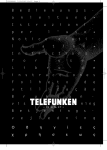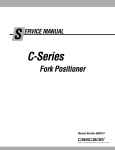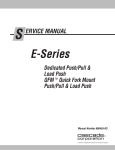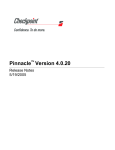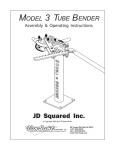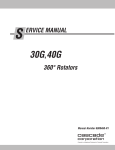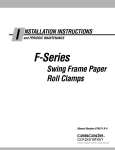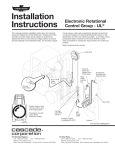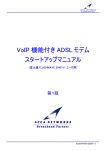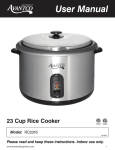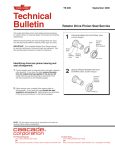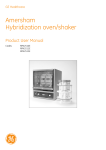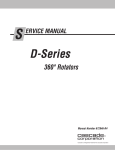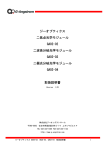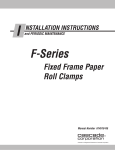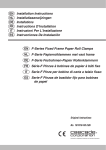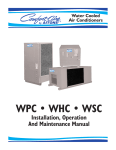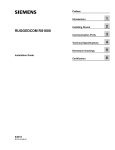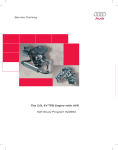Download 2 - Cascade Corporation
Transcript
S ERVICE MANUAL F-Series Fixed & Swing Frame Paper Roll Clamps Manual Number 674512-R7 cascade corporation Cascade is a Registered Trademark of Cascade Corporation C ONTENTS Page INTRODUCTION, Section 1 Introduction Special Definitions PERIODIC MAINTENANCE Section 2 100-Hour Maintenance 500-Hour Maintenance 2000-Hour Maintenance TROUBLESHOOTING, Section 3 General Procedures Truck System Requirements Tools Required Troubleshooting Chart Plumbing Hosing Diagram – Fixed Frame Hosing Diagram – Swing Frame Schematic – Fixed Frame Schematic – Split Long Arm Schematic – Swing Frame Schematic – Swing Frame, Split Long Arm Dual Drive with Brake Clamp Function Supply Circuit Test Clamp Circuit Test Swing Circuit Test Rotation Function Supply Circuit Test Rotation without Load Rotation with Load Electrical Circuit SERVICE, Section 4 Attachment Removal Arms Arm Assembly Wear Tile Replacement Contact Pad Arm Tip Repair Drive Group Removal Installation Disassembly and Service Reassembly Drive Motor Removal and Installation Disassembly Inspection Reassembly Rotator Drive Valves Check Valve Service Dual Drive Brake Valve i 1 1 2 2 2 3 3 3 3 4 4 5 7 8 9 10 11 12 12 12 13 14 14 14 15 16 17 18 18 19 20 20 22 22 22 24 26 26 27 29 29 31 31 32 Page SERVICE, Section 4, continued Revolving Connection Removal and Installation Shaft Only Service Seal-in-Shaft Service Seals-in-Body Service Two-Piece Seals-in-Body Service Split Arm Connection Service Counterbalance Valve Adjustment Split Arm Relief Pressure Adjustment- Type 1 Cylinders Servicing Cylinders on Attachment Cylinder Removal – Long or Short Arm Cylinder Removal – Swing Frame Cylinder Check Valve Service Cylinder Bushing Service Cylinder Service Cylinder Disassembly Cylinder Inspection Cylinder Reassembly Base Unit Swing Frame Service Frame Bushing Service Rotation Bearing Torque Inspection Rotation Bearing Removal and Installation Adjustable Bumper Service 180-Degree Hydraulic Stop Group Stop Valve Service Stop Position Adjustment Electronic Rotational Control Group ERC Stop Valve Service Stop Position Adjustment Stop Troubleshooting Solenoid Valve Service All Clamps Early Swing Frame Clamps SPECIFICATIONS, Section 5 Specifications Hydraulics Auxiliary Valve Functions Truck Carriage Torque Values 33 33 34 35 36 37 38 38 39 40 40 40 41 41 41 43 43 43 44 45 45 45 46 47 4/ 51 51 51 52 52 53 53 55 55 55 56 56 57 57 58 674512-R7 I 1.1 NTRODUCTION Introduction This manual provides the Periodic Maintenance, Troubleshooting, Service and Specifications for Cascade F-Series Paper Roll Clamps. In any communication about the attachment, refer to the product I.D. number stamped on the nameplate as shown. If the nameplate is missing, the numbers can be found stamped on the front of the faceplate top or side. IMPORTANT: All hoses, tubes and fittings on these attachments are JIC. NOTE: Specifications are shown in both inch and (Metric) units where applicable. All fasteners have a torque value range of ±10% of stated value. Nameplate Locations c SERIAL NUMBER CATALOG NUMBER ADDITIONAL EQUIPMENT ADDITIONAL EQUIPMENT ADDITIONAL EQUIPMENT RC0720.eps 1.2 LIFT TRUCK ATTACHMENT 674870 60F-RCP-459 WEIGHT LBS. ATTACHMENT CAPACITY POUNDS INCH LOAD AT CENTER CAPACITY OF TRUCK AND ATTACHMENT COMBINATION MAY BE LESS THAN ATTACHMENT CAPACITY SHOWN ABOVE. CONSULT TRUCK NAMEPLATE. RECOMMENDED SYSTEM PRESSURE – 2000 PSI MAXIMUM SYSTEM PRESSURE – 2300 PSI FOR TECHNICAL ASSISTANCE, PARTS AND SERVICE CONTACT: 1-800-227–2233 PORTLAND, OREGON USA 70 8 4 67 OR 459 CPR F 60 Special Definitions The statements shown appear throughout this manual where special emphasis is required. Read all WARNINGS and CAUTIONS before proceeding with any work. Statements labeled IMPORTANT and NOTE are provided as additional information of special significance or to make your job easier. WARNING - A statement preceded by WARNING is information that should be acted upon to prevent bodily injury. A WARNING is always inside a ruled box. CAUTION - A statement preceded by CAUTION is information that should be acted upon to prevent machine damage. IMPORTANT - A statement preceded by IMPORTANT is information that possesses special significance. NOTE - A statement preceded by NOTE is information that is handy to know and may make your job easier. 674512-R7 1 P 2.1 ERIODIC MAINTENANCE 100-Hour Maintenance WARNING: After completing any service procedure, always test the clamp through five complete cycles. First test the clamp empty, then test with a load to make sure the clamp operates correctly before returning it to the job. Every time the lift truck is serviced or every 100 hours of truck operation, whichever comes first, complete the following maintenance procedures: • Check for loose or missing bolts, worn or damaged hoses and hydraulic leaks. • Check the edges of the contact pads for wear or sharp nicks that could damage or tear paper rolls. Grind the edges smooth. Contact Pad Edges Contact Pad Pivot Joints • Check the contact pad pivot joints for wear and replace or repair as necessary. Refer to Section 4.2. Rotator Bearing Assembly Grease Fitting Rotator Drive Fill Plug • Lubricate plungers on 180 degree stop valve (if fitted). • Check that load-holding hydraulic system is functioning properly. Clamp Force Indicators 830141, 832442 and 200645 for paper roll clamps are available for this test. • Check decals and nameplate for legibility 2.2 500-Hour Maintenance After each 500 hours of truck operation, in addition to the 100-hour maintenance, perform the following procedures: • Check sample of baseplate capscrews for proper torque value. See Sections 4.9-3 and 4.9-4 for checking and replacement procedures. • Check sample of bearing capscrews for proper torque value. See Sections 4.9-3 and 4.9-4 for checking and replacement procedures. RC0749.eps Left Side • Tighten mounting hook capscrews. See Section 4.1-4 for specific Roll Clamp Model torque specifications. • Tighten rotator drive assembly capscrews to 75 ft.-lbs. (105 Nm). WARNING: Baseplate and bearing capscrew torque must be checked initially at 500 hours and then every 2000 additional hours. Failure to keep the capscrews tightened can result in attachment damage and serious injury. • Lubricate rotator bearing assembly with multi-purpose extreme-pressure NLGI 2 grease (Whitmore 'Omnitask' or equivalent). Rotate Clamp one full turn during procedure. • Check rotator drive gearcase lubricant level. Lubricant should be up to bottom of fill plug hole. If necessary, fill with Cascade Rotator Drive Lubricant, Part No. 656300, or SAE 90 wt. gear lube (AGMA 'mild' 6 EP Gear Oil). Replace plug. • Inspect all arm, frame and cylinder pivot bushings for wear and replace if necessary. Refer to Sections 4.7-5 and 4.9-2 for wear limits. • Inspect all load-bearing structural welds on arms, swing frame pivots, arm pivots and cylinder pivot areas for visual cracks. Replace components as required. • Inspect wear tile, arm tips and contact pads for wear and damage. Replace or repair as needed. Refer to Sections 4.2-2 and 4.2-4. 2.3 Bearing Capscrews (Access all through hole in baseplate) Rotator Drive Capscrews Baseplate Capscrews Rotator Drive Fill Plug 2000-Hour Maintenance After each 2000 hours of truck operation, in addition to the 100 and 500-hour maintenance, perform the following procedures: • Check all rotation bearing capscrews for proper torque value. See Section 4.9-3 and 4.9-4 for checking and replacement procedures. 2 Arm, Cylinder and Swing Frame Pivot Joints • Inspect all arm and cylinder pivot pins for wear and replace if necessary. Refer to Section 4.9. RC0750.eps Back (Driver's) View Mounting Hook Capscrews 674512-R7 T ROUBLESHOOTING 3.1 General Procedures 3.1-1 Truck Requirements WARNING: Before servicing any hydraulic component, relieve pressure in the system. Turn the truck off and move the truck auxiliary control valves several times in both directions. • Truck hydraulic pressure should be within the range shown in Specifications, Section 6.1. Pressure to the Clamp must not exceed the following: After completing any service procedure, test the attachment through several cycles. First test the attachment empty to bleed any air trapped in the system to the truck tank. Then test the attachment with a load to be sure it operates correctly before returning to the job. 45F–160F – 2300 psi (160 bar) 38F – 2600 psi (180 bar) • Truck hydraulic flow should be within the range shown in Specifications, Section 5.1. Stay clear of the load while testing. Do not raise the load more than 4 in. (10 cm) off the floor while testing. • Hydraulic fluid supplied to the attachment must meet the requirements shown in Specifications, Section 5.1. 3.1-2 Tools Required In addition to a normal selection of mechanic's hand tools, the following are required: • In-line Flow Meter Kits: 10 GPM (37 L/min) – Cascade Part No. 671476. OR 20 GPM (75 L/min) – Cascade Part No. 671477. Flow Meter Kits: 671476 (10 GPM – 37 L/min) 671477 (20 GPM – 75 L/min) (2)No. 8-12 JIC/ O-Ring • Pressure Gauge Kit (2 kits required): 5000 psi (345 bar) – Cascade Part No. 671212. Flow Meter GA0013.eps (2) No. 6-8 JIC Reducer • Assorted fittings, hoses, and quick-disconnect couplers as required. 3.1-3 Pressure Gauge Kit: 671212 Troubleshooting Chart Pressure Gauge* Determine All The Facts – It is important that all the facts regarding the problem are gathered before beginning service procedures. The first step is to talk to the equipment operator. Ask for a complete description of the malfunction. The following guidelines can then be used as a starting point to begin troubleshooting procedures: No. 6-6 Hose* GA0014.eps No. 4-6 Pipe/JIC* Clamp Circuit • Clamp drops roll after it has been picked up. • Clamp will not carry rolls to its rated capacity. • Clamp arms will not function properly. To correct one of these problems, see Section 3.3. • Clamp will not stop smoothly with 180 degree stop valve or electronic rotational control. To correct this problem, see Section 4.10 or 4.11. No. 6-8 JIC Reducer No. 4, No. 6* and No. 8 JIC/O-Ring Quick-Disconnect Couplers Male Straight Thread O-Ring Coupler: No. 4 (Part No. 212282)* No. 5 (Part No. 210378) No. 6 (Part No. 678592) • Split-arms will not clamp rolls equally. To correct this problem, see Section 4.6-3 or 4.6-4. Rotate Circuit • Clamp will not rotate. • Clamp will not rotate rolls up to its rated capacity. • Clamp rotates in one direction only. To correct one of these problems, see Section 3.4. No. 6 and No. 8 JIC Swivel Tee Female JIC Thread Coupler: No. 4 (Part No. 210385)* No. 6 (Part No. 678591) AC0127.eps * NOTE: Diagnostics Kit 394382 includes items marked. Swing Circuit • Clamp swings slowly or not at all. To correct this problem, see Section 3.3-3. 674512-R7 3 T ROUBLESHOOTING 3.2 Plumbing 3.2-1 Fixed Frame Clamp – Hosing Diagram Rotator Drive CCW Dual Drive Box CW RC4071.eps Long Arm Cylinders Short Arm Cylinders (if equipped) 2-Port Hose Reel CLAMP NOTE: Short arm cylinders operate only when the attachment is rotated to the 45-degree position. OPEN Revolving Connection 2-Port Hose Reel or Internal Hose Reeving Truck Auxiliary Valve (ROTATE) Truck Auxiliary Valve (CLAMP) ARM OPENING, ROTATE CCW RC0680.eps PRESSURE RETURN NOTE: For ARMS CLOSING, ROTATE CW, reverse the colors shown. 4 674512-R7 T 3.2-2 ROUBLESHOOTING Swing Frame Clamp – Hosing Diagram Revolving Connection Rotator Drive CCW CW Dual Drive Box RC4071.eps Long Arm Cylinders 4-Port Hose Reel Short Arm Cylinders (if equipped) CLAMP 1 NOTE: Short arm cylinders operate only when Clamp is rotated to the 45-degree position. Swing Cylinder 2 1 OPEN 2 2-Port Hose Reel or Internal Hose Reeving ROTATE Truck Auxiliary Valve (ROTATE and SWING) IN IN 77F Solenoid Valve RC0682.eps Truck Auxiliary Valve (CLAMP) C4 ARM OPENING, ROTATE CCW PRESSURE RETURN 45F, 60F Solenoid Valve C1 P T NOTE: For ARMS CLOSING, ROTATE CW, reverse the colors shown. 674512-R7 5 T 3.2-2 ROUBLESHOOTING Swing Frame Clamp – Hosing Diagram (Continued) Rotator Drive Revolving Connection Long Arm Cylinders Short Arm Cylinders (if equipped) 4-Port Hose Reel Port 3 Swing Cylinder Port 4 Port 3 Port 4 NOTE: Short arm cylinders operate only when Clamp is rotated to the 45-degree position. SWING EXTEND SWING RETRACT 2-Port Hose Reel or Internal Hose Reeving SWING Truck Auxiliary Valve (ROTATE and SWING) IN IN 77F Solenoid Valve RC0681.eps Truck Auxiliary Valve (CLAMP) SWING RETRACT PRESSURE RETURN NOTE: For SWING EXTEND, reverse the colors shown. 6 45F, 60F Solenoid Valve C2 C3 P T 674512-R7 T 3.2-3 ROUBLESHOOTING Fixed Frame Clamp – Hydraulic Schematic (Typical All Cylinders) Check Valve Test Port G G Short Arm Cylinders (if equipped) Long Arm Cylinders G G Revolving Connection CL CL OP OP OP OP CL CL Clamp Relief (if equipped) CLAMP Rotator Drive Motor OPEN Motor Check Valve CCW 2-Port Hose Reel or Internal Reeving CW 2-Port Hose Reel Truck Auxiliary Valve (ROTATE) Truck Auxiliary Valve (CLAMP) Truck Pump Truck Relief Truck Tank RC2477.eps 674512-R7 7 T 3.2-4 ROUBLESHOOTING Fixed Frame Clamp, Split Long Arm – Hydraulic Schematic (Typical All Cylinders) Various split long arm hydraulic circuits/revolving connections used. Test Port Check Valve G G Short Arm Cylinders (if equipped) Long Arm Cylinders G G Revolving Connection CL CL OP OP CL Split Long Arm Circuit Components (variations shown below ) Shuttle Spool Valve Sequence Valve OP CL OP Flow Divider RC2454.eps 29 79 22 CLAMP Rotator Drive Motor OPEN Cross-Over Relief (if equipped) Type 0 Shuttle Check Valve Check Valve CCW NOTE: Truck components not shown. CW Adjustable Relief Valve CL Flow Divider 65 17 21 CL Closing Free Arm Orifice (if equipped) Type 1 Adjustable Relief Valve Flow Divider CL Sequence Valve CL 08 88 OP 8 20 Early (Pre-Type 0) Shuttle Valve 674512-R7 T 3.2-5 ROUBLESHOOTING Swing Frame Clamp – Hydraulic Schematic (Typical All Cylinders) Test Port Check Valve G G Short Arm Cylinders (if equipped) Long Arm Cylinders G G Revolving Connection CL SWR OP OP OP OP CL CL CL CAUTION: Outer most hose on 4-port hose reel must connect to OPEN port on attachment. Swing Cylinder SWE Counterbalance Valves OPEN SWR CLAMP SWE Rotator Drive Motor Check Valve Solenoid-Operated Control Valve 77F Serial Numbers 675414–675467 4-Port Hose Reel or Internal Reeving Solenoid-Operated Control Valve CCW All Models (except as shown) CW 2-Port Hose Reel 1 2 3 4 C C CC 1 2 3 4 P T Truck Auxiliary Valve (CLAMP) Truck Pump Truck Relief Truck Auxiliary Valve (ROTATE and SWING) Truck Tank RC2466.eps 674512-R7 9 T 3.2-6 ROUBLESHOOTING Swing Frame Clamp, Split Long Arm – Hydraulic Schematic (Typical All Cylinders) Various split long arm hydraulic circuits/revolving connections used. Check Valve Test Port G G Short Arm Cylinders (if equipped) Long Arm Cylinders G G Revolving Connection OP CL OP SWR Split Long Arm Circuit Components (variations shown below) Swing Cylinder CL CL Counterbalance Valves (2) SWE OP OP CL Flow Divider Early (Pre-Type 0) Adjustable Relief Valve OPEN SWR CLAMP SWE Rotator Drive Motor Check Valve CCW 95 23 21 Adjustable Relief Valve NOTE: Truck components not shown. CW RC4334.eps Counterbalance Valves Type 0 Sequence Valve Shuttle Valve CL CL Sequence Valve 73 Early (Pre-Type 0) Flow Divider 87 20 CL Flow Divider OP Counterbalance Valves Counterbalance Valves CL OP OP 10 674512-R7 T 3.2-7 ROUBLESHOOTING Dual Drive with Brake – Hydraulic Schematic Dual Drive Brake Valve Rotator Dual Drive Motor Motor Check Valve 2-Port Hose Reel To Clamp Components Rotate Auxiliary Valve Clamp Auxiliary Valve Truck Pump Truck Relief Truck Tank RC4072.eps 674512-R7 11 T 3.3 ROUBLESHOOTING Clamp Function There are five potential problem areas that can affect the CLAMP function: • Clamping roll improperly, or handling rolls that exceed capacity of the attachment. Refer to Operator’s Guide for suggested procedures. • Low hydraulic pressure or flow from lift truck. • External leaks. • Defective solenoid coil or valve (if equipped). • Worn/defective revolving connection shaft seals or cartridge valves, cylinder seals or check valves. 3.3-1 Supply Circuit Test WARNING: Before removing hydraulic lines, relieve pressure in the Attachment hydraulic system. Turn the truck off and move the truck auxiliary control valves several times in both directions. 1 Check the pressure delivered by the truck. Refer to the truck service manual. The pressure must be within 100 psi (7 bar) of specified truck pressure. Pressure to the Clamp must not exceed the following: 45F–160F – 2300 psi (160 bar) 38F – 2600 psi (180 bar) • If one of the gauge pressures drops more than 150 psi (10 bar) initially, and additional drop exceeds 25 psi (2 bar) per minute, the cylinder check valve cartridge or piston seals may be faulty. Continue troubleshooting. • If both gauge pressures do not drop more than 150 psi (10 bar) initially, and additional drop does not exceed 25 psi (2 bar) per minute, the problem is not hydraulic (see Section 3.3). 3 Position both arms at midstroke to relieve cylinder pressure. Remove, swap and reinstall the cylinder check valve cartridges. 4 Long Arm Cylinders – While clamped on a medium to full size roll, close the long arm fully. Watch the gauge pressure readings. Short Arm Cylinders – Rotate the Roll Clamp to the 45-degree position. Close the short arm fully and hold the handle in the CLAMP position a few seconds to develop full truck system pressure. Watch the gauge pressure readings. • If the gauge pressure on the cylinder continues to drop more than 150 psi (10 bar) initially, and additional drop exceeds 25 psi (2 bar) per minute, the cylinder piston seals are faulty (see Section 4.7). • If the gauge pressure on the cylinder does not drop more than 150 psi (10 bar) initially, and additional drop does not exceed 25 psi (2 bar) per minute, the check valve (now in the other cylinder) is faulty and requires replacement (see Section 4.7-4). 2 Check the flow volume at the carriage hose terminal. See Section 5.1-1 for recommended flow volumes. If the truck pressure and flow are correct, proceed with the Clamp circuit pressure test. 3.3-2 Clamp Circuit Test 45F–160F WARNING: Before removing hydraulic lines, position both arms at midstroke to relieve cylinder pressure. Turn the truck off and move the truck auxiliary control valves several times in both directions. 1 Check for external leaks at the cylinders and revolving connection. 2 Long Arm Cylinders – Install a pressure gauge to each long arm cylinder's test port. While clamped on a medium to full size roll, close the long arm fully. Watch the gauge pressure readings. Short Arm Cylinders – Install a pressure gauge to each short arm cylinder's gauge port. Rotate the Clamp to the 45-degree position. While clamped on a medium to full size roll, close the long arm fully. Watch the gauge pressure readings. • If the initial gauge pressures are not within 100 psi (7 bar) of system pressure measured at the hose terminal, the revolving connection may be faulty and requires service. Refer to Section 4.6. 12 Pressure Gauge Long Arm Cylinder Test Port 2 RC2005.eps 38F 674512-R7 T 3.3-3 ROUBLESHOOTING Swing Circuit Test (Swing-Frame Clamp Only) 1 Clamp a vertical roll of the approximate weight capacity of the Clamp. Rotate 90 degrees to position the short arm down. Extend the swing cylinder fully to swing the frame upward. Swing Up • If the roll drifts downward, the revolving connection counterbalance valve may require service (see Section 4.6-4.). • If the roll does not drift down, continue troubleshooting. 2 Retract the swing cylinder to lower the roll: • If the roll drops suddenly, the counterbalance valve requires adjustment (see Section 4.6-7). 3 Short Arm Raise the roll and rotate 180° to position the long arm down. Retract the swing cylinder fully to swing the frame upward. • If the roll drifts downward, the revolving connection counterbalance valve may require service. Refer to Section 4.6-4. 4 Swing Cylinder • If the roll does not drift down, continue trouble shooting. Extend the swing cylinder to lower the roll: 1 Swing Cylinder Swing Up • If the roll drops suddenly, the counterbalance valve requires adjustment. Refer to Section 4.6-7. RC0790.eps Long Arm 3.3-4 3 Revolving Connection Sequence Valve Cartridge Troubleshooting For Type 0 and some early revolving connections with sequence valve cartridges, roll clamp arms may be effected by the sequence valve cartridge. The following circumstances may aid in troubleshooting: • If the arms will not move, the sequence valve cartridge may be stuck in the "closed" position or faulty. Refer to Section 4.6-6 for replacement procedure. • If the arms clamp uneven and do not build up clamp pressure, the cartridge may be faulty. Refer to Section 4.6-6 for replacement procedure. 674512-R7 13 T 3.4 ROUBLESHOOTING Rotation Function There are four potential problem areas that can affect the rotation function: Flowmeter • Operator may be handling roll incorrectly. Loads may be too heavy or rotated off-center, exceeding capacity of Clamp. Refer to Operator’s Guide for suggested handling procedures. • Low hydraulic pressure or flow from lift truck. • Worn or defective hydraulic rotator motor or check valve assembly. • Worn or defective drive assembly or rotator frame bearing assembly. 3.4-1 Supply Circuit Test WARNING: Before removing hydraulic lines, relieve pressure in the Attachment hydraulic system. Turn the truck off and move the truck auxiliary control valves several times in both directions. RC1132.eps Pressure Gauges Check Valve 1 Check the pressure delivered by the truck. Refer to the truck Service Manual. The pressure must be within 100 psi (7 bar) of specified truck pressure. Pressure to the Clamp must not exceed the following: 45F–160F – 2300 psi (160 bar) 38F – 2600 psi (180 bar) 2 Check the flow volume at the carriage hose terminal. See Section 5.1-1 for recommended flow volumes. If the truck pressure and flow are correct, proceed with the Rotation circuit pressure test. RC0303.ill Hydraulic Motor 3 Check for external leaks. 3.4-2 Rotation without Load Drive Box Single Drive Group 1 Install pressure gauges to the rotator motor fittings. 2 Rotate the Clamp without a load and note pressure readings of both gauges. • If the Clamp rotates faster in one direction than the other, or rotates in one direction only, the check valve assembly may need service. Refer to Section Section 4.5. • If the lower gauge reading exceeds 500 psi (35 bar), there is excessive back pressure in the supply circuit. Check for restrictions such as numerous fittings, 90-degree fittings, or hose sizes less than No. 8. 14 Pressure Gauges Dual Drive Group RR0191.eps 674512-R7 T 3.4-3 ROUBLESHOOTING Rotation with Load 1 Rotate a load requiring approximately 3/4 of the Model Maximum Torque Capacity 38F ★ • If the higher gauge reading is substantially less than the truck pressure as measured at the carriage hose terminal, the rotator motor geroter set may need repair. Refer to Section 4.4. 63,000 in.-lbs. @ 2300 psi (7,120 Nm @ 160 bar) 45F,60F, 66F ★ 80,000 in.-lbs. @ 23000 psi (9,040 Nm @ 160 bar) • If the higher gauge reading is close to truck pressure as measured at the carriage hose terminal and no rotation occurs, the rotator motor output shaft or drive box may need repair. Continue troubleshooting. 77F ★ 98,000 in.-lbs. @ 2300 psi (11,073 Nm @ 160 bar) 90F,100F attachment's maximum torque capacity as shown in the Table opposite and note gauge readings. Dual Drive Models – Remove the left drive group from the attachment as described in Section 4.3-1. Cap the connector fittings on the right hand drive group. Rotate a load requiring approximately 1/3 of attachment maximum torque. • If the higher gauge reading is substantially less than truck pressure measured at the junction block/hose terminal, the RH motor gerotor set may need repair. Refer to Section 4.4-2. • If the higher gauge is close to truck pressure measured at the junction block/hose terminal, and no rotation occurs. The RH motor output shaft or drive may need repair. Continue troubleshooting. • If the higher gauge is close to truck pressure measured at the junction block/hose terminal and rotation occurs. The LH motor output shaft or drive box may need repair. Continue troubleshooting. ■ 120F, 130F 120F, 130F 150F 150F ◆ ◆▲ 160F ◆ ■ ■▲ 128,000 in.-lbs. @ 2300 psi (14,462 Nm @ 160 bar) 145,000 in.-lbs. @ 2300 psi (16,383 Nm @ 160 bar) 114,000 in.-lbs. @ 2300 psi (12,880 Nm @ 160 bar) 147,000 in.-lbs. @ 2300 psi (16,610 Nm @ 160 bar) 114,000 in.-lbs. @ 2300 psi (12,880 Nm @ 160 bar) 216,000 in.-lbs. @ 2300 psi (24,405 Nm @ 160 bar) ★Rated at 15 GPM (56L/min.) flow. ■Rated at 20 GPM (75L/min.) flow. ◆Rated at 24 GPM (91L/min.) flow. ▲High Speed Option 2 Remove the motor from the drive box assembly as described in Section 4.4. 3 Reinstall the hoses to the rotator motor fittings. Actuate the rotate circuit. • If the rotator motor shows rotational output, the drive box may require service. Refer to Section 4.3-2. • If the rotator motor shows little or no rotational output, the rotator motor requires service. Refer to Section 4.4-2. 674512-R7 15 T ROUBLESHOOTING 3.5 Electrical Circuit Use the schematics shown and follow the steps below. 4 Disconnect the electrical leads from the solenoid coil (Solenoid-equipped attachments) terminals. Use a voltmeter to determine if there is voltage at the electrical lead terminals when the control knob button is depressed. 1 Check the control knob circuit fuse. Replace if • If there is no current to the solenoid, troubleshoot the electrical circuit for opens or shorts. 2 Check for loose electrical connections at the truck • If there is current to the solenoid, test for coil continuity and proper rating. necessary. ignition switch, control knob button, solenoid coil terminals and diode. 3 Remove the diode from the solenoid coil terminal. Test with an ohmmeter for high resistance in one direction and no resistance in the other direction. If there is no resistance in both directions, replace the diode. NOTE: When replacing the diode, the banded end must be connected to the coil and wiring as shown. 5 Test for coil continuity and rating by placing an ohmmeter test lead on each solenoid coil terminal (ohmmeter on Rx1 scale): • If there is a reading, the coil is good. Check for proper ohm value for the truck. • If the coil is good, but the solenoid does not 'click' when the control knob button is depressed, the solenoid cartridge may be jammed. Refer to Section 4.12. • If there is no ohmmeter reading, the coil is defective and should be replaced. Refer to Section 4.12. ALL CLAMPS (Except 77F swing frame early model) 12V: 2.4–2.8 Ohm 24V: 9.5–11 Ohm 36V: 24–28 Ohm 48V: 40–46 Ohm Coil Pushbutton attached to control lever with heat shrink tubing Control Knob with Pushbutton Solenoid Coil Pushbutton 7.5-Amp Fuse Solenoid Valve RC0736.eps White Diode IMPORTANT: Banded end must connect to positive (+) side of circuit. 7.5-Amp Fuse Diode Cable Black 77F SWING FRAME EARLY MODEL Pushbutton attached to control lever with heat shrink tubing Control Knob with Pushbutton White Diode IMPORTANT: Banded end must connect to positive (+) side of circuit. Solenoid Coils Diode 7.5-Amp Fuse Pushbutton 7.5-Amp Fuse Cable Black 16 Control Valve RC0747.eps 674512-R7 S 4.1 ERVICE Attachment Removal 1 1 Rotate the attachment to the vertical roll handling position. Extend the arms outside the width of the frame. WARNING: Before removing hydraulic lines, relieve pressure in the Attachment hydraulic system. Turn the truck off and move the auxiliary control valves several times in both directions. 2 Disconnect and plug the hydraulic supply hoses to the 4 attachment. Tag hoses for reassembly. Rotate CCW Rotate CW Lower Hooks 3 RC0758.eps Clamp 2 RC0441.eps Rotate CCW Rotate CW Open 3 Disconnect the lower hooks: Bolt-On Hooks – Remove the lower mounting hooks. For reassembly, tap hooks tight against lower carriage bar and tighten the capscrews to: Quick-Change Hooks – Pull out the locking pins and drop the lower hooks to the unlocked position. Reinstall the pins in the lower holes. For reassembly, slide the hooks up to the locked position and install the locking pins in the top holes. Swing Extend Clamp CL II, III 38F, 45F, 60F, 66F – 110 ft.-lbs. (150 Nm) CL IV 60F, 66F, 77F – 195 ft.-lbs. (265 Nm) CL IV 90F, 100F and higher – 260 ft.-lbs. (350 Nm) RC0446.eps Outer Hose Swing Retract Open 4 Set the attachment on a pallet. Tilt the mast forward and lower the carriage to remove the attachment from the truck. 5 For installation, reverse the above procedures with the following exceptions: WARNING: Hose connected to OPEN port must use outer-most hose on 4-port hose reel. • Refer to Fixed Frame Roll Clamp Installation 674510 or Swing Frame Roll Clamp Installation 674511 for complete installation procedures. 3 BOLT-ON HOOKS QUICK-CHANGE HOOKS Carriage Bar Guide RC0368.eps RC0367.eps ® ST U DJ A e LH lower Hook d ca s ca Locking Pin 674512-R7 -1 14 55 67 C- LH lower Hook in unlocked position 17 S 4.2 4.2-1 ERVICE Arms Cylinder Rod Anchor Pins Arm Assembly – Removal and Installation 1 Open the arm to be removed to mid-range position. Rotate the attachment to the vertical roll handling position. 2 Spacers 3 Shims (each joint) 2 Remove the cylinder rod anchor pins from both cylinder rods. Retract the cylinders. For reassembly, tighten the anchor capscrews to 35 ft.-lbs. (45 Nm). 3 3 Swing the arm being removed inward to contact the other arm. Rotate the attachment 90 degrees to position the arm being removed on top. 4 Attach an overhead hoist to the arm and take up slack in the chain. 2 5 Remove the arm pivot pins and spacers (if equipped). Note location of shims. Lift away arm assembly. For reassembly, tighten the arm pivot pin capscrews to 35 ft.-lbs. (45 Nm). NOTE: Clamps built after 6/87 are equipped with spacers at the arm pivot points. It is recommended that all Clamps be equipped with these spacers. Kits listed below include spacers for the swing frames, arms, and cylinder base pivots. Clamp Model RC0332.eps Spacer Kit WARNING: Check the attachment weight (located on the nameplate) to make sure the overhead hoist and chains or straps are at least the rated capacity of the attachment. 45F 681774 60F, 66F681775 77F, 90F, 100F681776 and larger 6 For reassembly, reverse the above procedures. 5 4 RC0333.eps 18 674512-R7 S 4.2-2 ERVICE Wear Tile Replacement The following procedure describes installing wear tiles on short arm tip castings using Service Kit 206588. The kit includes four replacement wear tiles. WARNING: Cascade Corporation recommends that a qualified welder experienced in this type of repair be used for best quality. 2 1 1 Rotate the clamp to the horizontal roll handling position with the short arm upward. Lower the clamp to the ground. 2 Clean the arm tip casting surfaces to be welded. Remove paint, rust, grease, scale and other contaminants. Weld Areas 3 Locate the wear tiles on the arm tip casting as shown. Clamp in place with a “C” clamp. 4 Preheat the weld area to 100° F (38° C) before welding. 5 Weld the wear tile backing plate to the arm tip casting using one of the following weld methods: RC0006.eps WELD METHOD A – Attach the ground wire to the short arm. Weld using FCAW (Flux Core Arc Weld) AWS E70T-1 1/16 in. (1.5 mm) diameter wire with 100% CO2 shielding gas at 35–50 CFH. Use DC+ polarity set at 26–30 volts and 260–325 amps. Apply the fillet holding a close arc. Do not oscillate or use a wash bead pattern. Let the welds slow cool. Hardfacing Surface WELD METHOD B – Attach the ground wire to the short arm. Weld using SMAW (Shielded metal arc welding) E-7018 low hydrogen 1/8 in. (3 mm) electrodes. Use DC+ polarity or a AC welding machine set at 130–325 amps. Do not use electrodes exposed to moisture without first re-drying them at 200° F (75° C) for 2 hours. Apply the fillet holding a close arc. Do not oscillate or use a wash bead pattern. Let the welds slow cool. Backing Plate .25 in. (6 mm) 6 Remove slag and inspect the welds. The following defects are not allowed: undercut, overlap, stress cracks and porosity. 7 Clean the weld area and repaint. RC0007.eps 674512-R7 19 S 4.2-3 ERVICE Contact Pad – Removal and Installation 1 Rotate the Clamp to the vertical roll handling position. 4 Pad Link Link Clevis Pin Lower the unit until the contact pads lightly touch the ground. 2 Contact Pad NOTE: If bolt-on pad surfaces are to be replaced, remove and replace at this point. Tighten capscrews to 15 ft.-lbs. (20 Nm). 2 Remove the clevis pins fastening the links to the contact pad. 3 Remove the pipe plug retainers or drive pin retainer from the contact pad pivot points and drive out the pivot pins. Pad Pivot Pin, Plugs 4 Remove the contact pad. Pad links can be removed from the arm by rotating 90 degrees and pulling out. Long arms links are held in by a spring. 5 38F – Assure pad opener springs are installed as 3 45F–120F PADS RC0334.eps shown. Replace as required. 6 For reassembly, reverse the above procedures with the following exceptions: 5 • Inspect the arm tips and pivot pins for wear and repair/replace as necessary. Refer to Section 4.2-3. • 38F – Install drive pin-type retainer 2 mm below outside surface of contact pad. Assure pin is an interference fit. (Pin .312 in. diameter x 1.250 in long). 4.2-4 Arm Tip Repair The following procedure describes tip removal and replacement using Service Kit 683065 (25F), 6047539 (38F), 674928 (45F, 60F, 66F) and 676810 (77F, 90F and larger). Each kit includes four replacement arm tips to repair one arm. WARNING: Cascade Corporation recommends that a qualified welder experienced in this type of repair be used for best quality. 1 Remove the contact pad as described in Section 4.2-2. 2 Scribe a cut line using dimension A, back from the inner surface of the existing pivot pin hole on both sides of the arm tip. Pad Link Spring Pad Opener Springs 3 Link Clevis Pin Plug Retainers 4 Pivot Pin OR Drive Pin Retainer 38F PADS RC1987.eps 3 Remove tips of arm casting A 3 Remove the worn tip portion of the arm casting at the cut line by grinding, sawing, or flame cutting. Remove any contaminants from around the repair area. Model Dimension A in. (mm) 25F 38F,45F 60F,66F 77F, 90F, 100F and larger 0.26 ± .03 (6.6 ± 0.7) 0.15 ± .03 (3.8 ± 0.7) 0.15 ± .03 (3.8 ± 0.7) 0.26 ± .03 (6.6 ± 0.7) A Cut line 20 2 RC0762.eps 674512-R7 S 4.2-4 ERVICE Arm Tip Repair (Continued) 4 Position the new tubes on the arm tips using dimensions Dimensions B in. (cm) C in. (cm) D in. (mm) 38F 5 Preheat the arm tip base metal to 70° F (21° C) 7.18 ± .06 (18.2 ± .15) 24.89 ± .12 (63.23 ± .30) 0.50 (12.7) 45F 9.06 ± .06 (23.0 ± .15) 27.12 ± .12 (68.8 ± .30) 0.50 (12.7) 6 Install the contact pad and pivot pins on the arms. 60F, 66F 9.06 ± .06 (23.0 ± .15) 28.46 ± .12 (72.2 ± .30) 0.50 (12.7) 7 Finish-weld the tubes to the arm tips using the following 77F, 10.06 ± .06 90F, (26.9 ± .15) 100F and larger 32.20 ± .12 (81.8 ± .30) 0.56 (14.2) B and C as shown. Place a rod of diameter D through all tubes for alignment. minimum and tack-weld the new tubes to the arm tips. Use the recommended weld procedures listed below. Check the tube alignment and realign as required. Remove the contact pad and pins. weld procedures: Model • Protect threaded end of tubes from weld spatter. • Preheat arm tip base metal as follows: 38F–90F – 150° F (66° C) 100F – 400°F (205° C). Start weld this side Monitor and maintain arm tip heat at locations shown using suitable temperature-indicating devices. • Weld sequence - Start weld on side indicated. Terminate each weld at center of tube. 0.40 in. (10 mm) • WELD METHOD A – FCAW (Flux Core Arc Weld). Attach ground wire to arm. Weld using AWS E70T-1 1/16 in. (1.6 mm) or 5/64 in. (2 mm) diameter wire with 100% CO2 shielding gas at 35–50 CFH. Set welding amps per manufacturer's recommendations. Apply weld holding a close arc. Do not oscillate or use a wash bead pattern. 2 in. (50 mm) Temperature Measurement Areas • WELD METHOD B – SMAW (Stick Welding). Attach ground wire to arm. Weld using E-7018 low hydrogen 1/8 in. (3.2 mm) or 5/32 in. (4 mm) electrodes. Set welding amps per manufacturer's recommendations. Do not use electrodes exposed to moisture without first re-drying them at 200° F (75° C) for 2 hours. Apply weld holding a close arc. Do not oscillate or use a wash bead pattern. Align new tubes flush with inner edge of casting. 7 B 4 • Cool arm tip base metal as follows: 38F–90F – normal air-cool. 100F – slow cool with insulating blanket cover. 8 Remove slag after each weld and inspect for defects. C NOTE: Arc craters, undercut, overlap and porosity are not permitted. Repair any weld defect as required. 9 Grind all welds to smooth transitions between parts. START STOP 7 START B Weld Sequence: START STOP START RC0306.eps D 674512-R7 21 S 4.3 4.3-1 ERVICE Drive Group Drive Group Removal and Installation 1 Remove the Clamp from the truck as described in 2 3 Section 4.1. 2 Dual Drive Units – Disconnect the crossover tubes from the check valve assembly. 3 Remove the four capscrews fastening the drive group to the baseplate. For reassembly, tighten the capscrews to 75 ft.-lbs. (100 Nm). 4 For reassembly, reverse the above procedures with the following exceptions: • After the drive group has been reinstalled, check the gearcase lubricant level. Lubricant must be up to the bottom of the fill plug hole. If necessary, fill with Cascade Gear Lube Part No. 656300, or SAE 90 wt. gear lube (AGMA 'mild' 6 EP Gear Lube). RC0171.eps Drive Group 4.3-2 Drive Group Disassembly and Service 1 Remove the drive group from the baseplate as 7 described in Section 4.3-1. 2 Lay the drive group, pinion down, on two 4 x 4 in. (10 x 10 mm) wood blocks placed on both sides of the pinion. Cover Plate 43 3 Remove the four capscrews fastening the cover plate to the housing. Housing 4 Remove the center capscrew plug from the cover plate 5 and install a (early) 3/8 in. NC or (later) M10 capscrew with a minimum thread length of 2 in. (50 mm). Remove the cover plate by turning the capscrew clockwise while lightly tapping around the sides of the cover plate. 5 Drain the lubricant from the housing. 6 Remove the three capscrews fastening the end cover to the housing. 7 Remove the drive motor as described in Section 4.4-1. 2 22 RC0172.eps 6 674512-R7 S 4.3-2 ERVICE Drive Group Disassembly and Service (Continued) Bearing outer race 8 Tap the worm and bearing assembly out through the end-cover side of the housing. Remove the opposite outer bearing race through the motor side of the housing. RC0173.eps Worm 8 Worm Gear 9 Press the pinion gear, seal, pinion bearings and worm gear out of the housing as an assembly. 9 RC0174.eps Housing Pinion Bearing Worm Gear Key 10 Remove the snap ring from the pinion gear shaft. Press the pinion gear bearing from the worm ring gear and cover plate pinion bearing. Remove the pinion shaft key. 10 Pinion Gear IMPORTANT: Heavy Duty Pinion uses two bearings with the first bearing retained by an additional snap ring (see illustration next page). 11 Press the pinion gear out of the housing pinion bearing. Remove seal. 12 Clean and inspect all components. Remove all dried sealant or threadlocker residue. Replace all worn items. Remove any burrs or sharp edges with emery cloth. Seal (if equipped) 11 RC2111.eps NOTE: Two types of large pinion bearing used: Sealed bearing, and bearing with separate seal (shown) 674512-R7 23 S 4.3-3 ERVICE Drive Group Reassembly Build up the pinion/worm gear assembly vertically with the pinion gear down. 1 PINION AND BEARING WITH EXTERNAL SEAL Housing Pinion Bearing (Non-sealed) Seal 1 Standard Pinion – Position the seal against the pinion gear, spring-side facing housing. Apply Loctite 271 (red) to clean and dry bearing seating area as shown. Press a non-sealed housing bearing onto the pinion shaft. IMPORTANT: Earlier design uses a sealed bearing. Pry out bearing seals when using an external seal. Remove excess Loctite. Pinion gear Bearing Seating Area Seal Seating Area Heavy Duty Pinion – No external seal is used. Position the first bearing and snap ring on the pinion shaft. Apply Loctite 271 (red) to the second bearing seating area as shown. Press the second bearing onto the pinion shaft. Remove excess Loctite. RC2118.eps PINION WITH SEALED BEARING Housing Pinion Bearing (Sealed) CAUTION: Verify that the Loctite does not squeeze into the seal or bearings. 2 Preheat worm gear to 200° F. Install the key, worm gear, cover plate pinion bearing and snap ring on the pinion. 3 Apply Loctite 271 (red) to clean and dry housing RC2648.eps seating area and shoulder for the housing pinion bearing and seal. Install the complete pinion assembly into the housing. Remove excess Loctite. HEAVY DUTY PINION WITH SEALED BEARINGS Baseplate Pinion Bearing CAUTION: Verify that the Loctite does not squeeze into the seal or bearings. 4 Install the worm's outer bearing race in the drive motor side of the housing. Make sure the race taper is inward as shown. Pinion Gear 5 Install the drive motor as described in Section 4.4-1. 6 Install the worm and bearings in the housing. Fully First Bearing Seating Area engage the worm with the drive motor shaft. Install the remaining outer bearing race. Make sure the race taper is inward as shown. Second Bearing Seating Area Key 4 Additional Snap Ring Housing Pinion Bearing RC2124.eps Worm Gear, Bearing, Snap Ring 2 RC2125.eps 3 Housing RC0179.eps 24 6 5 RC0178.eps 674512-R7 S 4.3-3 ERVICE Drive Group Reassembly (Continued) 7 Temporarily install the end cover without shims. the capscrews sequentially in 10 ft.-lb. (15 Nm) increments to 20 ft.-lbs. (30 Nm). Tighten 7 8 Measure the gap between the end cover and housing in three places with a feeler gauge or 'Pastigage' thread and determine the minimum gap. 9 Choose a combination of end cover shims equal to the minimum gap measured plus the next higher .005 in. (0.12 mm) increment. See examples below: (For .025–.029 in. measured gap, use .030 in. total shim thickness.) (For .010–.014 in. measured gap, use .015 in. total shim thickness.) (For .009 or less, use one .010 in. shim, since a minimum of one .010 in. shim is required for proper seal.) Housing RC0180.eps 8 End cover NOTE: Shim Service kit 670578 contains the shims listed. A minimum of one .010 shim is required to seal against leakage: Qty Part No. Color Thickness 1 1 1 1 671758 671757 670574 674513 Blue Brown/Clear Pink Yellow .020 in. (.50 mm) .015 in. (.38 mm) .010 in. (.25 mm) .005 in. (.13 mm) 11 10 Remove the end cover. Apply Loctite 515 sealant (Cascade Part No. 668184) to both surfaces of the shims and the capscrews. Install the shim pack and end cover. Tighten the capscrews to a torque of 65 ft.-lbs. (90 Nm). Remove excess sealant. 11 With the gearcase laying flat, fill with 56 fluid ounces (540 ml) of Cascade Gear Lube Part No. 656300, or SAE 90 wt. gear lube (AGMA 'mild' 6EP Gear Lube). 12 Install the cover plate and gasket. Install the four cover plate capscrews and tighten to 15 ft.-lbs. (20 Nm). Install the center hole plug. 13 Reinstall the drive group on the rotator baseplate as described in Section 4.3-1. RC0181.eps 9 10 12 Cover plate RC0182.eps 674512-R7 25 S 4.4 4.4-1 ERVICE Drive Motor Drive Motor Removal and Installation 1 Remove the attachment from the lift truck as described WARNING: Before removing hydraulic lines, relieve pressure in the hydraulic system. Turn the truck off and open the truck auxiliary control valves several times in both directions. in Section 4.1. 2 Remove the drive group from the attachment as described in Section 4.3-1. 3 Remove the fill plug and drain the lubricant from the drive group. 4 Lay the drive group, pinion down, on two 4 x 4 in. (10 x 10 cm) wood blocks placed on both sides of the pinion gear. ▲ If equipped. Adapter plate is on motors with Cascade part no. less then 608XXXX. 5 Remove the four capscrews and special lockwashers fastening the check valve assembly to the drive motor. Keep track of the two O-rings between the check valve assembly and drive motor. For reassembly, tighten the capscrews to 15 ft.-lbs. (20 Nm). Drive Motor O-Rings Check Valve 6 Remove the three capscrews fastening the adapter 8 Adapter Plate ▲ 7 8 5 6 plate to the gearcase housing. Tap on the drive motor with a rubber mallet to separate the drive motor/ adapter plate assembly (if equipped) from the gearcase housing. 7 If equipped with adapter plate, remove the four capscrews fastening adapter plate to the drive motor. Separate the motor from the adapter plate. 8 For reassembly, reverse the above procedures except 4 RC0778.eps 3 Fill Plug (two locations) as follows: • Apply Loctite 515 sealant (Cascade Part No. 668184) to both sides of the drive motor/adapter plate gasket, if equipped. Apply sealant to the threads of the four drive motor capscrews. Install the gasket and adapter plate to the drive motor. Tighten capscrews to 40 ft.-lbs. (55 Nm). • Apply sealant to both sides of the adapter plate/ gearcase (or motor/gearcase) gasket. Apply sealant to the threads of the three adapter plate capscrews. Install the drive motor/adapter plate assembly and gasket to the gearcase housing. Tighten the capscrews to 65 ft.-lbs. (90 Nm). • Fill the drive group with fill with 56 fluid ounces (540 ml) Cascade Gear Lube (Part No. 656300), or SAE 90 wt. gear lube (AGMA 'mild' 6 EP Gear Lube). 26 674512-R7 S 4.4-2 ERVICE Drive Motor Disassembly Cascade provides service replacement parts for the seals indicated with a ▲ below. Due to cost, if other parts need replacement, the complete drive motor assembly should be replaced. O-Ring ▲ Capscrews (7) 1 Remove the drive motor from the drive group as described in Section 4.3-1. End Cap Housing O-Ring ▲ IMPORTANT: Clean the outside of the drive motor and service in a clean, dust-free work area. Use a soft-jawed vise for all service procedures. RR0840.eps 2 Remove O-rings from housing. Geroler Set Spacer Plate Flange (608XXXX or less) O-Ring ▲ Splined Drive Housing Output Shaft Wiper Seal ▲ Thrust Bearing Load Bearing Race Flange Seal ▲ 4 5 3 2 Pressure Seal ▲ Brass Shim ▲ Capscrews (4) Flange (609XXXX or greater) 3 Make a scribe across the drive motor, inline with the capscrew and drive motor’s port surface. 4 Clamp drive motor in a soft-jawed vise across the flange RR0632.eps with the output shaft downward. 5 Remove all capscrews from the end cap. 6 Remove altogether the end cap, geroler set and spacer plate. The splined drive should remain in place with this group. 7 Remove the O-rings from the end cap, geroler set and 6 housing. 8 Turn the drive motor over, clamping the housing across the port area with the flange upward. 8 FRONT RR0623.eps RR0841.eps 674512-R7 27 S ERVICE 9 Remove the four Loctited capscrews from the flange with a X10 Torx Socket. Do not use an impact wrench. CAUTION: Thread sealant used on the capscrews may require a small amount of heat to the housing to remove the capscrews. Use a temperature indicator to prevent overheating the housing. 10 Turn the flange 45 degrees clockwise. 11 Remove the flange and output shaft by pushing the 45° 10 Flange output shaft from under the housing and pulling up on the tapered portion of the output shaft. 12 Remove the flange and thrust bearing from the output shaft. 13 Remove the load bearing race and flange seal from the flange. 14 Remove the wiper seal and pressure seal from the flange using a seal removal tool or modified screwdriver as shown. NOTE: Remove the seals by pushing from the back side, as shown. 9 RR0842.eps 15 Remove the brass shim from the flange. Flange 14 11 14 15 13 RR0860.eps Modified Screwdriver RR0843.eps 12 Flange Original Design RR0858.eps 28 RR0859.eps 674512-R7 S 4.4-3 ERVICE Drive Motor Inspection • Remove all Loctite residue from the threaded holes. • Clean all parts with solvent and blow dry. Do not use paper or cloth towels. • Inspect all parts for small nicks, burrs or scratches. Remove imperfections with emery cloth. Replace parts where imperfections could not be removed. • Inspect the flange seal seats for scratches. Check for cracks in the flange area that could cause leakage. 4.4-4 Drive Motor Reassembly 1 Install the brass shim into the pressure seal side of the flange. Install wiper seal and pressure seal into the flange. The pressure seal must be seated evenly. 2 Place the bearing race in the flange seated evenly with the pressure seal and flange. Wiper Seal Flange Brass Shim 3 Lubricate the flange seal with petroleum jelly and seat in lip of flange on the pressure seal side, as shown. 4 Install thrust bearing onto the output shaft. 5 Install the flange onto the output shaft with the pressure seal side against the output shaft. 6 Clamp housing into the vise with the flange side facing RR0633.eps Pressure Seal Flange Seal Bearing Race upward. 7 Install the output shaft/flange assembly into the housing. 8 Apply Loctite sealant 242 (blue) or equivalent to the four holes of the housing and the four capscrews. Wipe away any excess sealant. Install the four capscrews and tighten in a criss-cross pattern to 250 in.-lbs. (28 Nm). IMPORTANT: Capscrews must be clean and dry. 5 4 8 Output Shaft 7 RR0861.eps RR0862.eps 674512-R7 29 S ERVICE 9 Turn the housing over and clamp across the flange with the output shaft taper facing down. 10 Lubricate the O-rings and install into the housing, 10 geroler set and endcap grooves. 11 Align the output shaft timing dot with the screw hole that is aligned to the port surface. Use the scribe mark to help with the alignment. 12 Use the drive splines to align the geroler star point with the capscrew hole, as shown. CAUTION: Geroler spacers can fall out. 13 Assemble together the endcap with O-ring, geroler set with O-ring, drive (short spline end into geroler set and spacer. IMPORTANT: Make sure O-rings are properly seated. 14 Install endcap assembly onto housing while aligning the scribe marks and capscrew holes. Make sure the drive engages with output shaft. RR0675.eps 15 Install the capscrews into the end cap. Tighten the capscrews using a criss-cross pattern to 240 in.-lbs. (27 Nm). 11 Timing Dot on Output Shaft 12 2 7 5 4 Screw hole that is aligned with port surface. 3 6 1 Star Point Scribe Mark RR0627.eps 15 Port Surface End Cap O-Ring 14 Short Spline Splined Drive Geroler Set O-Ring Splined Drive Spacer Plate O-Ring Timing Dot RR0647.eps RR0654.eps 30 674512-R7 S ERVICE 4.5 Rotator Drive Valves 4.5-1 Check Valve Service WARNING: Before removing hydraulic lines, relieve pressure in the hydraulic system. Turn the truck off and open the truck auxiliary control valves several times in both directions. 1 2 Valve 1 Disconnect the hydraulic hoses to the drive group valve. Tag hoses for reassembly. 2 Remove the four capscrews fastening the check valve to the drive group. Keep track of the two O-rings between the check valve and drive motor. For reassembly, tighten the capscrews to 18–24 ft.-lbs. (25–30 Nm). 3 Remove the plug fittings, check valve internal parts (early) or cartridges (later). 4 Clean all parts with clean solvent or kerosene. any burrs or sharp edges with emery cloth. Remove O-Rings 5 Inspect the internal ball seats for imperfections that would keep the balls from seating fully. 6 For reassembly, reverse the above procedures except as follows: • Note the correct direction of the internal conical springs (Spring Type). RC0214.eps • Install new O-rings and Back-up rings on the check valve cartridges as shown (Cartridge Type). SPRING TYPE CARTRIDGE TYPE Body C W C 3 Check Valve Cartridges CC W W C CW RC0197.eps RC2522.eps 5 6 Check Cartridge 6 O-Rings 6038929 CKCB-XCN Sun RC2519.eps Back-Up Rings 674512-R7 31 S Dual Drive Brake Valve 1 Disconnect the hydraulic tubes to the LH drive break valve. Tag tubes for reassembly. 2 Remove the four capscrews fastening the brake valve to the LH drive group. Keep track of the two O-rings between the check valve and drive motor. For reassembly, tighten the capscrews to 24 ft.-lbs. (30 Nm). 3 Remove the plugs, fittings and valve cartridge. 4 Clean all parts with clean solvent. Remove any burrs or sharp edges with emery cloth. 1 2 Valve CCW WARNING: Before removing hydraulic lines, relieve pressure in the hydraulic system. Turn the truck off and open the truck auxiliary control valves several times in both directions. CW 4.5-2 ERVICE O-Rings 5 For reassembly, reverse the above procedures except as follows: • Install new O-rings and Back-up rings on the valve cartridge. RC4084.eps Pressure Relief Cartridge O-Rings 3 Check Valve Fittings RC4088.eps Back-Up Rings Shuttle Cartridge Valve Body Shuttle Cartridge O-Ring GA0203.eps Back-Up Rings Cartridges RC4086.eps Check Valve Cartridge O-Rings GA0426.eps Back-Up Ring 32 674512-R7 4.6 Revolving Connection 4.6-1 Removal and Installation WARNING: Before removing any hydraulic lines, relieve pressure in the attachment hydraulic system. Turn the truck off and move the auxiliary control valves several times in both directions. TYPICAL MOUNTINGS Front Views FLANGE Tighten to 40 ft.-lbs. (55 Nm) SHORT ARM CL OP CL OP LONG ARM CL OP CL OP S ERVICE RC0805.eps Tighten to 8 ft.-lbs. (10 Nm) BRACKETS Revolving Connection RC0785.eps NOTE: Revolving Connections vary in mounting style and configuration. See typical examples opposite. 1 Remove the attachment from the lift truck as described in Section 4.1. 2 Disconnect the hoses and tubes from the front and rear RC0804.eps Tighten to 8 ft.-lbs. (10 Nm) EYE PIN of the revolving connection. Tag for reassembly. 3 Remove the capscrews fastening the revolving connection to the faceplate. For reassembly, tighten capscrews as noted in the illustration opposite. 4 Remove the revolving connection from the faceplate. 5 For reassembly, reverse the above procedures with the following exceptions: RC0926.eps • Service revolving connection in a clean work area. Refer to Sections 4.6-2 through 4.6-6. Open Swing Retract C P O L C P LONG ARM Swing Extend O 'TOP' stamping SHORT ARM Clamp BRACKET PIN L • Position shaft/end block so that CLAMP/OPEN fittings are on the left side (driver's view), or the 'TOP' stamping (if marked) is upward. Tighten to 8 ft.-lbs. (10 Nm) RC1972.eps RC2479.eps Back (Driver's) View 674512-R7 33 S 4.6-2 ERVICE Shaft Service (Seals-in-shaft type only) 1 Remove the attachment from the lift truck as described 3 in Section 4.1. 2 45F Clamps – Remove the revolving connection keeper bracket. For reassembly, tighten the capscrews to 8 ft.-lbs. (10 Nm). 3 Disconnect the hoses from the shaft end block only and cap the fittings. 4 Clean the revolving connection and adjacent parts with clean solvent or kerosene. 5 Remove the snap ring from the front of the revolving connection shaft. CAUTION: Remove all burrs and paint from exposed shaft surface prior to removal from the body. Burrs or paint chips pulled through the bore will permanently damage the valve body. 6 Remove the shaft from the body. 7 Remove and replace the shaft seals as described in 2 Keeper Bracket (if equipped) 5 Snap Ring Section 4.6-3 8 For reassembly, reverse the above procedures. RC0799.eps 34 674512-R7 S 4.6-3 ERVICE Seals-in-Shaft Revolving Connection Service O-Rings 1 Remove the revolving connection from the attachment as described in Section 4.6-1. 2 Remove the snap ring from the revolving connection shaft. CAUTION: Remove all burrs and paint from exposed shaft surface prior to removal from the body. Burrs or paint chips pulled through the bore will permanently damage the valve body. 3 Remove the shaft from the body. 4 Swing Frame Clamps – Remove the counterbalance RC2504.eps Back-up Rings COUNTERBALANCE VALVE CARTRIDGE Back-up Rings valve cartridges. 5 Remove the O-rings and back-up rings from the shaft and counterbalance valve cartridges. 6 Remove the fittings from the shaft and body. 7 Clean all parts with clean solvent or kerosene. 8 Inspect the body bore for grooves and scratches. bore is worn, replace the body. If the 9 For reassembly, reverse the above procedures with the FIXED FRAME SHAFT following exceptions: O-Rings O-Rings • Install new back-up rings and O-rings on the shaft and counterbalance valve cartridges as shown. • Lubricate the shaft and counterbalance valve cartridges with O-ring lube or petroleum jelly prior to reassembly. Shaft 3 RC0803.eps SWING FRAME SHAFT Back-up Rings SWING FRAME REVOLVING CONNECTION 2 O-Rings, Back-up Rings 5 Snap Ring Counterbalance Valve Cartridge FIXED FRAME REVOLVING CONNECTION Body 5 4 RC0779.eps O-Rings, Back-up Rings 674512-R7 35 S 4.6-4 ERVICE Seals-in-Body Revolving Connection Service 1 Remove the revolving connection from the attachment as described in Section 4.6-1. Seals 2 Remove the front snap ring from the shaft. 7 FIXED FRAME BODY Back-up Rings CAUTION: Remove all burrs and paint from exposed shaft surface prior to removal from the body. Burrs or paint chips pulled through the bore will permanently damage the valve body. O-Ring 3 Remove the shaft/end block assembly from the body. 4 Remove the end block from the shaft. NOTE: For reassembly, orient block and shaft as shown. Apply Loctite 271 (red) to the capscrews and tighten to 15 ft.-lbs. (20 Nm). RC0781.eps 7 5 Remove the O-rings and back-up rings from the body and counterbalance valve cartridges using a hook-type brass seal removal tool (Cascade Part No. 674424). NOTE: Do not scratch grooved surfaces. Back-up Rings SWING FRAME BODY 6 Clean all parts with clean solvent or kerosene and inspect the following areas: • Shaft sealing surface – Remove minor surface imperfections with 320-grit emery paper. Sand radially (around) shaft. Break sharp edges on front of shaft. If severely worn, replace shaft. • Body grooves – Remove minor nicks or projections that may damage seals during installation. If severely worn, replace body. 7 For reassembly, reverse the above procedures with the following exceptions: Back-up Rings O-Rings • Install new back-up rings and O-rings as shown. • Lubricate shaft and body with O-ring lube or petroleum jelly. Use shaft/seal loader, rotate body during installation. RC0831.eps Plug End Block 4 O-Rings 3 Shaft Plug O-Rings SWING FRAME REVOLVING CONNECTION Body 5 Snap Ring FIXED FRAME REVOLVING CONNECTION SHORT ARM CL OP CL OP 36 LONG ARM CL OP CL OP O-Rings, Back-up Rings RC0782.eps Counterbalance Valve Cartridges 5 O-Rings, Back-up Rings 674512-R7 S 4.6-5 ERVICE Two-Piece Seals-in-Body Revolving Connection Service • Clean all traces of oil and moisture from seal grooves inside revolving connection body using a non-petroleum based cleaner. (Example: electronic contact cleaner). 1 Remove the revolving connection from the attachment as described in Section 4.6-1. 2 Remove the front snap ring from the revolving connection shaft. CAUTION: Remove all burrs and paint from exposed shaft surface prior to removal from the body. Burrs or paint chips pulled through the bore will permanently damage the valve body. 3 Remove the shaft from the body. 4 Remove the end block from the shaft. Remove the relief cartridge (if equipped). For reassembly, apply Loctite 271 (red) to the capscrews and tighten to 15 ft.-lbs. (20 Nm). 5 Remove the two-piece seals from the body using a brass hook-type seal removal tool (Cascade Part No. 674424). CAUTION: Do not scratch grooved surfaces. 6 Clean all parts with clean solvent or kerosene and • Clean hands thoroughly to remove all traces of oil and moisture prior to 2-piece seal installation. • Install square rubber rings into revolving connection body grooves. • Install Teflon rings over rubber rings. IMPORTANT: Use a seal installation tool, or form seal rings into a 'kidney' shape as shown to install. Avoid sharp bends. Use finger pressure to smooth rings into grooves. • Lubricate shaft and body with hydraulic fluid prior to reassembly. • Use seal/shaft loader and apply gentle pressure to install shaft in body. Rotate body to ease installation. AC0044.eps 7 Seal Installation Tool (Cascade Part No. 599514) FIXED FRAME BODY Body inspect the following areas: • Check shaft sealing surface. Remove minor surface imperfections with 320-grit emery paper. Sand radially (around) shaft. Break edges on outer end of shaft and snap ring grooves. If severely worn, replace shaft. • Check seal grooves in body. Remove minor nicks or projections with 320-grit emery paper. If severely worn, replace body. 7 For reassembly, reverse previous procedures with the following exceptions for the two-piece seals: • Install new O-rings between shaft and end block. RC0372.eps Teflon Ring Two-Piece Seals Square Rubber Ring FIXED FRAME REVOLVING CONNECTIONS Rear Snap Ring 4 7 O-Rings Body RC0488.eps 3 SHORT ARM C O P L 38F 674512-R7 LONG ARM SHORT ARM O P C RC01973.eps CL LONG ARM L Shaft Form seals into 'Kidney' shape to install CL End Block, Capscrews Two-Piece Seals 45F–100F Front Snap Ring 2 37 S 4.6-6 ERVICE Split Arm Revolving Connection Service O-Rings NOTE: Various revolving connections and cartridges are used with Split-Arm Clamps (see Section 3.2, Hydraulic Schematics for versions). All are serviced in a similar manner. A typical example is shown below. RC2494.eps 1 Remove, disassemble and service the revolving Back-Up Rings SEQUENCE VALVE CARTRIDGE connection using the same procedures as described in previous Sections 4.6-3, 4.6-4 and 4.6-5. O-Rings 2 Use illustration opposite when installing new Back-up rings and O-rings on the cartridges FIXED FRAME SPLIT ARM REVOLVING CONNECTION RC2502.eps Back-Up Rings Clamp Relief Valve (if equipped) Sequence Valve End Block FLOW DIVIDER CARTRIDGE O-Ring Shuttle Spool Valve Body GA0203.eps Back-Up Ring Flow Divider O-Rings Rear Snap Ring SHUTTLE CHECK VALVE CARTRIDGE O-Rings Shaft RC2501.eps Shuttle Check Valve 4.6-7 Two-Piece Seals Front Snap Ring RC0454.eps Back-Up Rings RELIEF VALVE CARTRIDGE Swing Frame Counterbalance Valve Adjustment Revolving Connection 1 Rotate the attachment to the bilge (horizontal) position with the short arm down. 2 Activate the SWING function and check for smooth extend and retract at equal, moderate speeds. • If attachment moves upward suddenly when SWING EXTEND function is activated, adjust cartridge labeled 'Swing Extend Adjust' (see illustration). Loosen nut and turn adjustment screw counterclockwise (CCW) to reduce swing speed or clockwise (CW) to increase swing speed. • If attachment moves downward suddenly when SWING RETRACT function is activated, adjust cartridge labeled 'Swing Retract Adjust' (see illustration). Loosen nut and turn adjustment screw counterclockwise (CCW) to reduce swing speed or clockwise (CW) to increase swing speed. 38 SWR Swing Retract Adjust SWE Swing Extend Adjust RC0784.eps NOTE: Typical revolving connection, front view, Clamp rotated to bilge position, short arm down. 674512-R7 S 4.6-8 ERVICE Split Arm Relief Pressure Adjustment – Type 1 (Full Arm Travel Circuit) WARNING: Make sure all personnel are clear of the attachment during testing. IMPORTANT: Revolving connection with relief valve controlled split-arm circuit must be adjusted for proper arm movement as follows: Split Long Arm Cylinder 1 Confirm that the truck relief setting is between 2000–2600 psi (140–180 bar). 2 Rotate the Clamp to the vertical roll handling position. WARNING: Before removing any hoses, relieve pressure in the hydraulic system. With the truck off, open the truck auxiliary control valve(s) several times in both directions. 3 Install 5000-psi (345 bar) pressure gauges to each split long arm cylinder test port (No. 4 O-ring fitting required). 4 Open the long arms. Clamp a short roll (30 in. diameter min.) or clamp-force indicator, between the short arm pad and lower split long arm pad. Build pressure until the upper arm begins to move. Release the lever and note the gauge pressure. 5 Rotate the Clamp 180 degrees. Repeat step 4 for the opposite split long arm. Both pressures should be within 50 psi (3.5 bar). If not, adjust the relief cartridge (screw out CCW) on the arm with the higher pressure to equal the arm with the lower pressure. NOTE: 1 turn = approximately 400 psi (28 bar). 6 At half throttle, compare the gauge pressure with truck relief pressure. Adjust both relief cartridges equally using 1/8 turn steps. Verify that the unclamped arm moves after the clamped arm stops and re-syncs upon opening. 7 Adjust the clamped arm pressure to approximately 200 psi (14 bar) lower than truck relief pressure. If not possible, lower relief settings equally and test until system resets. Start step 6 procedure again to maximize clamped arm pressure. RC0349.eps 3 Test Port Plug 3 Pressure Gauge IMPORTANT: If truck is equipped with a 3 or 4 pressure selection valve, adjust split arm relief cartridges while pressure selection valve is at its lowest supply setting. Revolving Connection Split Long Arm A 8 Check that the clamp pressures are approximately equal (see step 5). Tighten the jam nut on each relief cartridge. LONG ARM 4 Relief (A) controls Split Long Arm A SHORT ARM Split Long Arm B 674512-R7 5 Relief (B) controls Split Long Arm B RC3074.eps Short Arm 39 S 4.7 4.7-1 ERVICE Cylinders Servicing Cylinders on the Clamp 2 1 Close the arm attached to the cylinder being serviced. Rotate the attachment to the vertical roll handling position. 2 Remove the cylinder rod anchors from both cylinders. For reassembly, tighten the anchor capscrews to 35 ft.-lbs. (45 Nm). 4 3 Retract the cylinder rods. Swing the cylinder to be serviced outward to expose the cylinder rod and retainer. WARNING: Before servicing hydraulic components, relieve pressure in the attachment hydraulic system. Turn the truck off and move the auxiliary control handles several times in both directions. 4 Place a drip pan under the cylinder and disconnect the 3 1 hoses from the cylinder ports. Plug the hose ends and tag for reassembly. 5 Service the cylinder as described in Section 4.8. RC0307.eps 4.7-2 Cylinder Removal – Long or Short Arm 4 3 1 Close the arm attached to the cylinder being removed. Rotate the Clamp to the vertical roll handling position. 2 Remove the cylinder rod anchor pins from both cylinders. For reassembly, tighten the anchor capscrews to 35 ft.-lbs. (45 Nm). 2 WARNING: Before servicing hydraulic components, relieve pressure in the attachment hydraulic system. Turn the truck off and move the auxiliary control handles several times in both directions. 3 Swing the arm inward. Place a drip pan under the cylinders and disconnect the hoses from the cylinder ports. Plug the hose ends and tag for reassembly. 4 Remove the cylinder base anchor pins. Note the location of shims. For reassembly, tighten the anchor capscrews to 35 ft.-lbs. (45 Nm). 1 4 5 Service the cylinder as described in Section 4.8. RC0308.eps 40 674512-R7 S 4.7-3 ERVICE Cylinder Removal – Swing Frame 1 Position the swing cylinder rod to midstroke. Rotate the attachment to the vertical roll handling position. 2 WARNING: Before removing hydraulic hoses, relieve pressure in the attachment hydraulic system. Turn the truck off and move the auxiliary control valves several times in both directions. 3 2 Place a drip pan under the cylinder and disconnect the hoses from the cylinder ports. Plug the hose ends and tag for reassembly. 3 Remove the anchor pin retainer and anchor pin from both ends of the cylinder. Remove the cylinder and note location of shims. For reassembly, tighten the anchor capscrews to 10 ft.-lbs. (13 Nm). RC0309.eps 4 Service the cylinder as described in Section 4.8. 4.7-4 Cylinder Check Valve Service 1 Close the arm attached to the cylinder being serviced to gain access to the cylinder check valve. Rotate the attachment to the vertical roll handling position. WARNING: Before removing hydraulic hoses, relieve pressure in the attachment hydraulic system. Turn the truck off and move the auxiliary control valves several times in both directions. 2 45F–120F Cylinder Check Valve Cartridge 2 Remove the check valve cartridge from the cylinder port. 3 Remove the O-rings and Back-up rings. check valve cartridge with clean solvent. Clean the 4 Install new O-rings and Back-up rings as shown. 5 Lubricate the check valve cartridge with O-ring lube or petroleum jelly prior to reassembly. Tighten the check valve cartridge to 35 ft.-lbs. (45 Nm). 4 RC1980.eps CHECK VALVE CARTRIDGE O-Rings RC0311.eps 674512-R7 38F Back-up Rings 41 S 4.7-5 ERVICE Cylinder Bushing Service NOTE: Bushings require replacement if bushing-to-pin clearance exceeds 1/16 in. (1.6 mm). 1 Remove the cylinder from the Clamp as described in Section 4.7-2 or 4.7-3. RC1984.eps 2 Remove the bushings from the cylinder using a bushing driver. NOTE: Bushing drivers can be machined using the dimensions shown below. 3 Install new bushings in the cylinder. same number of bushings removed. Replace with the CAUTION: Bushings may be damaged if installed without a proper bushing driver. Bushing Driver Dimensions A Bearing I.D. B Driver O.D. 38F, 45F 1.11 in. (28.2 mm) 1.36 in. (34.5 mm) 60F, 66F 1.23 in. (31.2 mm) 1.48 in. (37.6 mm) 70F, 90F and larger 1.23 in. (31.2 mm) 1.48 in. (37.6 mm) 1.5 in. (38 mm) 2 Bushings 7 in. (178 mm) B A RC0362.eps 42 674512-R7 S 4.8 4.8-1 ERVICE Cylinder Service Cylinder Disassembly NOTE: Use a soft-jawed vise for all cylinder disassembly and assembly procedures. 1 2 RC0314.eps 1 Clamp the cylinder so that the vise jaws contact only the 5 4 extreme end of the cylinder base. 2 Screw the piston retainer out with a pin-type spanner wrench or special socket. 3 Remove the piston/rod/retainer assembly from the cylinder shell. 4 Clamp the piston/rod/retainer assembly across the rod end. RC0315.eps IMPORTANT: Never clamp directly on the rod sealing surface. 5 Remove the piston nut from the rod. 6 Clamp the piston on the top and bottom in a soft-jawed vise. Pry the seals up with a brass seal removal tool and cut to remove. RC0346.eps CAUTION: Do not scratch the seal grooves. 6 RC0359.eps Check Cartridge Piston Nut 5 Shell Piston / Rod assembly 3 Retainer 2 RC1977.eps 4.8-2 Cylinder Inspection • Inspect the rod, piston and retainer for nicks or burrs. Remove minor nicks or burrs with 320-grit emery cloth. If they cannot be removed, replace the parts. • Inspect the cylinder shell bore and remove any minor nicks or burrs with a butterfly hone (320-grit). If the nicks or burrs cannot be removed, replaced the part. • Inspect the outside of the shell for any deformities or cuts that could impair performance or cause leaks under pressure. If necessary, replace the part. 674512-R7 43 S 4.8-3 ERVICE Cylinder Reassembly 1 Polish the piston and retainer chamfer angle with 400 1 Chamfer Angle 3 grit emery cloth to facilitate seal installation. Clean all parts thoroughly. 2 Lubricate all new seals and O-rings with O-ring lube or petroleum jelly. 3 Install new seals and O-rings on the piston and retainer. Hook one side of the seal in the groove and carefully work it over the piston or retainer as shown. Note the direction of the U-cup seals. Pressure seals must always be installed with the lip toward the high pressure side of the cylinder. Wear Ring 4 Install the composite wear ring on the piston. 5 Install the retainer and then the piston on the cylinder rod. Tighten the piston retaining nut to the following torque value: 38F –110 ft.-lbs. (150 Nm) 45F –225 ft.-lbs. (305 Nm) 60F, 66F, 77F – 450 ft.-lbs. (610 Nm) 90F & larger– 400–450 ft.-lbs. (545–610 Nm) 4 RC1982.eps Stop Fins 6 Cylinder Shell Piston Seal Loader RC0320.eps 6 Place the piston loader furnished with the seal kit into the cylinder shell. Assure that the loader covers all the cylinder shell threads but does not contact the thread relief chamfer. Trim the loader stop fins if more engagement is needed. Thread Refief chamfer Piston/Rod Assembly CAUTION: The piston will not enter the cylinder shell properly if the loader contacts the thread relief chamfer. 7 Apply a thick film of petroleum jelly to the inside of the cylinder shell, piston loader and piston seals. Using a rubber mallet, tap the piston/rod assembly through the loader into the cylinder shell. 8 Remove the loader by cutting down one side and pulling it out of the cylinder bore. 9 Screw the retainer into the cylinder shell and tighten to the following torque value: RC1983.eps 38F – 200 ft.-lbs. (270 Nm). 45F –400 ft.-lbs. (540 Nm). 60F, 66F, 77F – 450 ft.-lbs. (610 Nm). 90F & larger – 450 ft.-lbs. (610 Nm). 45F–100F Seal Piston Seals 4 44 38F Seal 4 5 Retainer Seals 38F Seal O-Ring Piston Nut 7 Swing Cylinder 45F–100F Seal 8 O-Ring RC1978.eps 11 Retainer 674512-R7 S ERVICE 4.9 Base Unit 4.9-1 Swing Frame Service Swing frame Pivot Pins, Retainers 1 Rotate the attachment to the vertical roll handling position. 2 Remove the arms from the attachment as described in Section 4.2-1. 3 Remove the clamp and swing cylinders as described in Connector Pin 5 Spacer 4 Shims Sections 4.7-2 and 4.7-3. 4 Remove the pin connecting the swing casting and 5 rollers to the swing frames. For reassembly, tighten the retainer capscrews to 35 ft.-lbs. (45 Nm). 5 Remove the swing frame pivot pins and spacers (see note below). Note the location and quantity of shims removed. For reassembly, tighten the retainer capscrews to 35 ft.-lbs. (45 Nm). Shims NOTE: It is recommended that all Clamps be equipped with spacers at the swing frame pivot points as shown. Kits listed below include spacers for the swing frame, arms and cylinder base pivots: Clamp Model Spacer RC0323.eps Swing Casting Spacer Kit 45F 60F, 66F 77F, 90F & larger 681774 681775 681776 2 1 6 For reassembly, reverse the above procedures. 4.9-2 1 Frame Bushing Service RC0324.eps NOTE: Bushings require replacement if bushing-to-pin clearance exceeds 1/16 in. (1.6 mm). 2 1 Swing Frame Clamps – Remove the swing frames from the faceplate as described in Section 4.9-1. Fixed Frame Clamps – Remove the arms from the Clamp as described in Section 4.2-1. 2 Remove the bushings from the frames using a bushing driver. 1 1 NOTE: Bushing drivers can be machined using the dimensions shown in the chart below. 3 Install new bushings in the frames. See chart below. CAUTION: Bushings may be damaged if installed without a proper bushing driver. RC0325.eps Bushing Driver Dimensions A Bushing I.D. B Driver O.D. Bushing Bushing Bushing Bushing ➀ ➁ ➀ ➁ 38F, 45F 1.23 in. 1.11 in. 1.48 in. 1.36 in. (31.2 mm) (28.2 mm) (37.6 mm) (34.5 mm) 60F, 66F 1.48 in. 1.23 in. 1.73 in. 1.48 in. (37.6 mm) (31.2 mm) (43.9 mm) (37.6 mm) 1.5 in. (3.8 cm) 77F, 90F, 1.73 in. 1.23 in. 1.98 in. 1.48 in. 100F and (43.9 mm) (31.2 mm) (50.3 mm) (37.6 mm) larger B A 7 in. (17.8 cm) RC0362.eps 674512-R7 45 S 4.9-3 ERVICE Rotation Bearing Assembly – Capscrew Torque Inspection 1 500-Hour Inspection Every 500 hours perform the following inspection: 1 Check the accessible baseplate capscrews above Baseplate Capscrews Baseplate the upper mounting hooks for proper torque value as follows: tighten each capscrew CW until torque is 10 ft.-lbs. (14 Nm) above torque value listed below. Mark each capscrew after checking: 38F–100F – 75 ft.-lbs. (100 Nm) 120F–160F – 220 ft.-lbs. (300 Nm) • If any baseplate capscrews rotate, are loose or broken, go to 2000-hour inspection criteria and replace complete set of baseplate fasteners as described in Section 4.9-4. • If capscrews do not rotate, continue with bearing capscrew inspection in Step 2. 2 Check three bearing capscrews for proper torque value as follows. Remove the access plug from the back of the baseplate and rotate the attachment to the predominant vertical roll-handling position. Locate the three capscrews closest to the access hole and tighten each capscrew CW until torque is 10 ft.-lbs. (14 Nm) above torque value listed below. Mark each capscrew after checking: 2 RC2320.eps Bearing Capscrews Baseplate 38F–100F – 75 ft.-lbs. (100 Nm) 120F–160F – 220 ft.-lbs. (300 Nm) • If any bearing capscrews rotate, are loose or broken, go to 2000-hour inspection criteria and replace complete set of bearing fasteners as described in Section 4.9-4. RC2319.eps • If capscrews do not rotate, inspection is complete. Access Plug Faceplate 2000-Hour Inspection Every 2000 hours perform the following inspection: NOTE: Remove attachment from truck to provide access to all baseplate capscrews. Remove baseplate (shown) or use access hole to provide access to all bearing capscrews (see Section 4.9-4). 1 Check all capscrews as follows: tighten CW until torque is 10 ft.-lbs. (14 Nm) above torque values listed above. Mark each capscrew after checking. • If any capscrews rotate, are loose or broken, replace complete set of rotation bearing fasteners as described in Section 4.9-4. • If capscrews do not rotate, inspection is complete. Rotation Bearing (Baseplate removed) Back (Driver's) Views 46 RC2316.eps 674512-R7 S 4.9-4 ERVICE Rotation Bearing Assembly – Removal and Installation 2 1 Remove the attachment from the lift truck as described in Section 4.1. 2 Remove the drive group as described in Section 4.3-1. 3 Remove the upper mounting hooks. For reassembly, tighten the capscrews as follows: 38F, 45F – 110 ft.-lbs. (150 Nm) 60F, 66F, 77F, CLIII – 110 ft.-lbs. (150 Nm) 60F, 66F, 77F, CLIV – 195 ft.-lbs. (265 Nm) 90F & larger – 260 ft.-lbs. (360 Nm) 4 38F, 45F Clamps – Remove the revolving connection keeper bracket. For reassembly, tighten the capscrews to 8 ft.-lbs. (10 Nm). RC0326.eps 5 Remove the capscrews fastening the baseplate to the bearing assembly. For reassembly, tighten capscrews using the following technique: WARNING: Install short capscrews in counterbored holes only. Use lockwashers if supplied in kit. 3 Baseplate Capscrews – A) Apply Loctite 242 (blue) to clean and dry capscrews. Clean and dry the threaded holes in the bearing. Threads must be clean and dry for new Loctite to cure properly. WARNING: Check the attachment weight (located on the nameplate) to make sure the overhead hoist and chains or straps are at least the rated capacity of the attachment. B) Tighten using the alternating cross-pattern shown to one-half the final torque value shown below. C) Tighten using the alternating cross-pattern to the final torque value, then double-torque by backing off 1/2 turn and immediately retightening to the final torque value shown below: Faceplate 38F–100F – 75 ft.-lbs. (100 Nm) 120F–160F – 220 ft.-lbs. (300 Nm) 4 CAUTION: Do not reuse old capscrews or washers. Use new hardware kit when installing a new bearing assembly. 6 Alternating cross-pattern tightening sequence. RC2306.eps NOTE: Remove center lower mounting spacer (if equipped) to gain access to bearing capscrews. For reassembly, tighten capscrews to: 60F, 66F, 77F – 15 ft.-lbs. (20 Nm) 90F, 100F, 120F – 30 ft.-lbs. (40 Nm) Baseplate Bearing Assembly, Capscrews 5 RC0327.eps Center Lower Spacer 6 Attach two eyebolts to the baseplate. Attach an overhead hoist and lift the baseplate away from the faceplate/bearing assembly. 674512-R7 47 S 4.9-4 ERVICE Rotation Bearing Assembly – Removal and Installation (Continued) 7 Remove the capscrews fastening the bearing assembly to the faceplate. For reassembly, apply threadlocker and tighten the capscrews using the following technique: Bearing Capscrews – Faceplate A) Apply Loctite 242 (blue) to clean and dry capscrews. Clean and dry the threaded holes in the faceplate. Threads must be clean and dry for new Loctite to cure properly. B) Tighten using the alternating cross-pattern shown to one-half the final torque value shown below. C) Tighten using the alternating cross-pattern to the final torque value, then double-torque by backing off 1/2 turn and immediately retightening to the final torque value shown below: 38F–100F – 75 ft.-lbs. (100 Nm) 120F, 130F – 135 ft.-lbs. (180 Nm) 160F – 220 ft.-lbs. (300 Nm) CAUTION: Do not reuse old capscrews or washers. Use new hardware kit when installing a new bearing assembly. Alternating cross-pattern tightening sequence. 8 9 Felt Seal RC0328.eps 7 RC2330.eps 8 Attach two eyebolts to the bearing assembly as shown. Grease Fitting Heat Treat Zone Faceplate Attach an overhead hoist and lift the bearing assembly away from the faceplate. 9 check the condition of the felt seal for the center hole. Replace if necessary. 10 For reassembly, reverse the above procedures with the following exceptions: • When installing the rotation bearing assembly on the faceplate, align and position the heat-treated overlap zone 'R' on the ring gear with the outer race grease fitting as shown. 38F – 30 degrees above horizontal. 45F, 60F, 66F – 34 degrees above horizontal. 77F–160F – 38 degrees above horizontal. • Apply multi-purpose extreme pressure NLGI No. 2 grease (Whitmore 'OmniTask' or equivalent) to the teeth of the bearing assembly ring gear. 48 • After remounting the attachment, apply chassis grease to the bearing assembly grease fitting. Rotate the attachment slowly during the procedure. R 10 RC0331.eps Back (Driver's) View 674512-R7 S 4.9-5 ERVICE Adjustable Bumper Service 1 Rotate the Clamp to the vertical roll handling position. 2 Raise approximately 2 ft. (60 cm) off the ground. 2 Remove the top and bottom cylinder pivot pin retainers. For reassembly, tighten the retainer capscrews to 35 ft.-lbs. (50 Nm). 3 Pull the pivot pins out of engagement with the bumper rollers approximately 2 in. (5 cm). CAUTION: Do not completely remove the cylinder pivot pins. 4 Remove the tiedown capscrews from the arms. reassembly, tighten the capscrews to 15 ft.-lbs. (20 Nm). Cylinder Pivot Pins Cylinder Pivot Pin Retainers Tiedown Capscrews 4 3 For 5 Remove the capscrews fastening the belt anchor bars to the arms. Remove the belt. For reassembly, tighten the capscrews to 35 ft.-lbs. (50 Nm). 5 FIXED FRAME CLAMP Belt Anchor Bar Capscrews RC0683.eps Bumper Rollers 2 Belt Anchor Bar Capscrews 5 Cylinder Pivot Pins 3 Cylinder Pivot Pin Retainers Tiedown Capscrews 4 SWING FRAME CLAMP RC0684.eps 674512-R7 49 S 4.9-5 ERVICE Adjustable Bumper Service (Continued) Bushing Driver Dimensions A Bearing I.D. 6 For reassembly, reverse the above procedures with the following exceptions: • Inspect bumper belt roller surface for wear and replace if necessary. Remove by splitting surface down the side with a screwdriver. 38F, 45F 1.11 in. (28.2 mm) 1.36 in. (34.5 mm) 60F and larger 1.23 in. (31.2 mm) 1.48 in. (37.6 mm) • Install new bushings into the rollers using a bushing driver. NOTE: Bushing drivers can be machined using the dimensions shown in the table. CAUTION: Bushings may be damaged if installed without a proper bushing driver. B Driver O.D. 7 in. (178 mm) 1.5 in. (38 mm) B A • Adjust belt tension by fully opening both arms and attaching the long arm belt anchor bar to the set of holes that allow the belt to lay flat against the frame. RC0362.eps NOTE: Belt anchor bars have offset holes which allow additional tension adjustment. Adjust Long Arm Anchor Bar 6 Belt flat against frame Adjust Long Arm Anchor Bar 6 Belt flat against frame RC0685.eps SWING FRAME CLAMP 50 FIXED FRAME CLAMP 674512-R7 S 4.10 ERVICE 180-Degree Hydraulic Stop Group 4.10-1Stop 12 180° Stop Valve Valve Service WARNING: Before removing hydraulic lines, relieve pressure in the hydraulic system. Turn the truck off and open the truck auxiliary control valves several times in both directions. 3 1 Disconnect the hydraulic hose and tubing from the stop valve fittings. 2 Remove the 90 degree fitting that extends through the baseplate. 3 Remove the capscrews and remove the stop valve from RC0690.eps the baseplate. For reassembly, tighten the capscrews to 35 ft.-lbs. (50 Nm). 4 Remove the end gland nuts, plungers and spring. Remove all fittings from the valve block. 5 Clean all parts with kerosene or solvent. 6 For reassembly, reverse the above procedures with the following exceptions: Wiper Ring Back-up Ring Stop Valve Block O-Rings 4 Gland Nut • Install new O-rings, back-up rings, wiper rings. O-Rings RC0691.eps Plunger Wiper Ring Spring Plunger Gland Nut Back-up Ring 4.10-2Stop Position Adjustment 1 Rotate the Clamp in each direction and assure that the Clamp stops in the proper vertical or horizontal position. 2 If the stops need to be adjusted, loosen the stop bolt locknut and adjust the stop bolt as required. Tighten the locknut. 2 RC0692.eps 674512-R7 51 S 4.11 ERVICE Electronic Rotational Control (ERC) 4.11-1ERC 1 Stop Valve Service WARNING: Before removing hydraulic lines, relieve pressure in the hydraulic system. Turn the truck off and open the truck auxiliary control valves several times in both directions. 1 Disconnect the ROTATE hydraulic hoses from the stop valve fittings and tag for reassembly. Stop Valve Block ROTATE Supply Hoses 3 O-Rings STOP Solenoid Coil (side) Limit Switches, Deceleration Ramps, Stop Capscrews 2 Remove the solenoid coils by unscrewing the mounting nut and sliding the coil off the valve cartridge. For reassembly, tighten the nut lightly to 5 ft.-lbs. (7 Nm). DECEL Solenoid Coil (top) 3 Remove the four capscrews and remove the stop valve from the rotator drive assembly. Keep track of the two O-rings. For reassembly, tighten the capscrews to 35 ft.-lbs. (50 Nm). 2 4 Service the valve in a clean work area. Remove the solenoid and cartridge valves. Remove all fittings from the valve block. Clean all parts with solvent. Control Box AC1102.eps 5 For reassembly, reverse the above procedures with the following exceptions: • Install new O-rings and back-up rings on cartridge valves and valve block as shown. • For complete installation procedures refer to Electronic Rotational Control Installation Instructions 6048228. Retainer Nut 4 DECEL Coil, Wiring Harness Counterbalance Valve Cartridges Tighten to: 35 ft.-lbs. (45 Nm) 5 2-WAY SOLENOID VALVE O-Rings Back-up Rings RC1014.eps 4-WAY SOLENOID VALVE O-Rings Two-Way Solenoid Valve Tighten to: 80 ft.-lbs. (110 Nm) Back-up Rings O-Rings COUNTERBALANCE VALVE STOP Coil, Wiring Harness AC0339.eps Valve Block 52 RC1013.eps Four-Way Solenoid Valve Tighten to: 18 ft.-lbs. (25 Nm) RC1015.eps Back-up Rings 674512-R7 S ERVICE 4.11-2Stop Position Adjustment 1 Rotate the attachment in each direction to verify it stops Rotational Control stops Clamp at vertical positions A top, B bottom, and C bilge position. in vertical and horizontal (bilge) positions. • If rotation does not stop at vertical or bilge positions, proceed to Troubleshooting, Section 4.11-3. A • If attachment stops in vertical and horizontal (bilge) positions, proceed to Step 2. • If rotation does not stop at exact vertical or bilge positions, limit switches may be adjusted as described in Step 4. 2 Wait 3 seconds to rotate attachment again, verifying it To continue rotation after stopping, wait 3 seconds, OR press override button. For continuous rotation, press and hold button. C again stops in the vertical or horizontal (bilge) positions. 3 Press and hold override pushbutton and verify that the attachment will rotate continuously without stopping. B • If continuous rotation does not occur when holding pushbutton, proceed to Troubleshooting, Section 4.11-3. AC0231.eps 4 Inspect limit switch end rollers for full engagement on deceleration ramps and stop capscrews. If required, adjust limit switch position and/or stop capscrew to precisely locate stop position within ± 0.5 in. (13 mm). Limit Switches (Normally Open) (Early Model) 4.11-3Stop Troubleshooting NOTE: Reference schematic on facing page. 1 Check ERC main power fuse/relay, control lever pushbutton. NOTE: Pushbutton is normally closed (NC), providing power to ERC. Verify the 12V-96V is reaching ERC control box when truck key is turned on. 2 Inspect all electrical cables. Look for and correct loose connections, pinched wiring, or wrongly-connected cables. Stop Capscrew Deceleration Ramp AC0242.eps Limit Switches (Normally Open) NOTE: Cable connectors and control box are labeled to show proper connections. 3 Check continuity of solenoid/cable assemblies and limit switch/cable assemblies and replace if needed. 4 With truck key on, manually operate limit switches and (Late Model) listen for 'clicks' at solenoids, indicating solenoid coil operation. Or, rotate Clamp into ramps and check for voltage at control box solenoid output connectors. 5 Look for 3-second time delay between rotation decelerating and ability to restart rotation. If there is no delay, or Clamp will not rotate continuously with pushbutton depressed, replace ERC control box. NOTE: Control box contains adjustable time delay, contact Cascade for adjustment procedure. AC1214.eps Deceleration/Stop Ramp 674512-R7 53 S ERVICE Rotational Control Electrical Hookup STOP Limit Switch (Normally Open) DECEL Solenoid (top) NOTES: 1. All cables are 2 conductor with Deutsch type connectors. STOP Solenoid (side) Rotator Drive Valve Block DECEL Limit Switch (Normally Open) 2. Electrical Supply: Relay preferred for Rotational Control Only, Power Bus/Relay preferred for multiple accessories. 3. Refer to the following documents for additional help: Mast Coil Cord Power Supply/ Communications Group Power DECEL Sw DECEL Sol STOP Sol STOP Sw Cable Junction Box NOTE: Factory adjusted time delay relay inside. If necessary, Contact Cascade to change setting. ERC Installation Instructions – Part No. 6048228 Relay Installation Instructions – Part No. 6006270 Power Bus/Relay Installation Instructions – Part No. 6048228 ROTATE Control Lever Override Push Button if equipped. (Normally Closed) Carriage + – Relay (12V–96V) Power Bus/Relay (12V output only) NOTE: Fuses inside: Main Power – 20A Circuits – 7.5A OR + + Fuse, 7.5A@12V 3 2 4 1 – –+ Unswitched Unswitched Switched Switched Truck Fuse Block Truck Fuse Block Truck Battery 54 –++– + 12V Truck Battery AC0662.eps IC Trucks – Use chassis ground. Electric Trucks – Use battery ground. 674512-R7 S 4.12 ERVICE Solenoid Valve 4.12-1All 2 Clamps 3 (Except 77F Models with serial numbers 675414–675467) 1 Remove the cover from the valve assembly. 2 Disconnect the wires and diode from the coil terminals. 3 Loosen the end cover capscrews. Remove the end 4 cover and coil. Note the position of the coil terminals in relation to the valve body. 4 Install the new coil and end cover. terminals are positioned correctly. RC0204.eps Assure that the 5 For reassembly, reverse the above procedures with the following exceptions: Coil • Refer to the electrical schematic in Section 3.5 for correct wire and diode installation. 4.12-2Early Solenoid Valve Solenoid Coil Swing Frame Clamps Cartridges 4 2 (Serial numbers 675414–675467) NOTE: No longer available, replaced by above. 1 Remove the cover from the valve assembly. 2 Disconnect the wires and diode from the coil terminals. 3 Remove the solenoid cartridge top nut and coil. 4 Remove the solenoid cartridges and check valve 3 cartridges from the valve body. Remove the seals from the cartridges. 5 For reassembly, reverse the above procedures with the following exceptions: • Install new O-rings and back-up rings as shown. • Lubricate the cartridge seals with O-ring lube or petroleum jelly prior to installation. • Refer to the electrical schematic in Section 3.5 for correct wire and diode installation. O-Rings RC0687.eps O-Rings 5 RC0688.eps Back-up Rings Back-up Rings SOLENOID VALVE CARTRIDGE 674512-R7 CHECK VALVE CARTRIDGE 55 S PECIFICATIONS 5.1 Specifications 5.1-1 Hydraulics Truck Relief Setting 45F–160F Clamp & Rotate Circuits, 38F Rotate Circuit 2000 psi (140 bar) Recommended 2300 psi (160 bar) Maximum 38F Clamp Circuit 2300 psi (160 bar) Recommended 2600 psi (180 bar) Maximum Truck Flow Volume ➀ Min. ➁ Recommended Max. ➂ 38F Clamp 5 GPM (19 L/min.) 10 GPM (38 L/min.) 12 GPM (45 L/min.) Rotate 5 GPM (19 L/min.) 10 GPM (38 L/min.) 15 GPM (57 L/min.) 5 GPM (19 L/min.) 10 GPM (38 L/min.) 15 GPM (57 L/min.) 77F, 90F, 100F, 10 GPM 120F (38 L/min.) 15 GPM (57 L/min.) 20 GPM (76 L/min.) 15 GPM (57 L/min.) 20 GPM (76 L/min.) 25 GPM (95 L/min.) 45F, 60F, 66F 130F, 150F, 160F GA0357.eps ➀ Cascade Roll Clamps are compatible with SAE 10W petroleum base hydraulic fluid meeting Mil. Spec. MIL-0-5606 or MIL-02104B. Use of synthetic or aqueous base hydraulic fluid is not recommended. If fire resistant hydraulic fluid is required, special seals must be used. Contact Cascade. ➁ Flow less than recommended will result in a rotate speed less than 2 RPM. ➂ Flow greater than maximum can result in excessive heating, reduced system performance and short hydraulic system life. Hoses and Fittings • ROTATE Function – Hoses and fittings should be No. 8 with 13/32 in. (10 mm) minimum I.D. • CLAMP Function – Hoses and fittings should be No. 8 with 13/32 in. (10 mm) minimum I.D., except for internal reeving arrangements where hoses and fittings may be No. 6 minimum with 9/32 in. (7 mm) minimum I.D. 56 674512-R7 S 5.1-2 PECIFICATIONS Auxiliary Valve Functions Tilt Forward Hoist Down Rotate CCW (Swing Extend) Release GA0082.eps Clamp Hoist Up Tilt Back 5.1-3 Rotate CW (Swing Retract) Truck Carriage GA0091.eps Carriage Mount Dimension (A) ITA (ISO) A Class II Class III Class IV Minimum Maximum 14.94 in. (380.0 mm) 18.68 in. (474.5 mm) 23.44 in. (595.5 mm) 15.00 in. (381.0 mm) 18.74 in. (476.0 mm) 23.50 in. (597.0 mm) GA0028.eps 674512-R7 57 S 5.1-4 PECIFICATIONS Torque Values Fastener torque values for the F-Series Roll Clamp are shown in the table below in both US and Metric units. All torque values are also called out in each specific service procedure throughout the manual. NOTE: All fasteners have a torque value range of ±10% of stated value. Ref. Fastener Location Size Ft.-lbs. Nm Cl II/III ■▲ 5/8 (M16) Cl 4 (60F-77F) .75 (M20) Cl 4 (90F-120F) M20 110 195 260 150 265 360 5/8 (M16) 110 150 3 Lower Hook Spacer Upper Capscrew 5/8 (M16) (60F) 70 95 4 38F/45F Lower Center 60F/66F Spacer Capscrew 77F 5/8 (M16) .25 (M12) 3/8 (M10) 110 75 15 150 100 20 5 Baseplate Capscrews 38F 45F-100F 120F-160F M12 .50 (M12) .75 (M20) 66 80 280 90 105 380 6 Bearing Capscrews 38F-100F 120F-150F 160F .50 (M12) .75 M20 80 280 394 108 380 534 Rotator Mounting Capscrew .50 (M12) 75 100 Rotator Cover Plate Capscrew 5/16 (M8) 15 20 Valve Mounting Capscrew 5/16 (M8) 20 30 Motor Mounting Capscrew 3/8 (M10) 40 50 Rotator End Cover Capscrew 7/16 (M12) 60 80 Shaft End Block Bracket Capscrew 3/8 (M10) 8 10 180 Degree Stop Valve Capscrew 3/8 (M10) 35 45 Pivot Pin Retainer Capscrew 3/8 (M10) 35 45 End Block Capscrew ✖ 3/8 (M10) 15 20 Index Block Mounting Capscrew .75 (M20) 30 40 1 Upper & Lower Hook Capscrew 2 Lower Hook Spacer Capscrew (38F-77F) 7 8 9 10 11 12 13 14 15 16 8 710 9 11 6 13 1 5 12 15 4 1 ITA II/III 1 2 1 38F, 45F 2 4 3 4 2 60F, 66F ITA II/III ITA III 77F 1 ■ Use Loctite 242 (Blue) ▲ Double-Torque (tighten, loosen 1/2 turn, retighten) ✖ Apply Loctite 271 (Red) ITA IV 90F, 100F, 120F ITA IV 16 1 RC3710.eps 14 14 RC0436.eps 58 674512-R7 BLANK Do you have questions you need answered right now? Call your nearest Cascade Service Department. Visit us online at www.cascorp.com AMERICAS Cascade Corporation U.S. Headquarters 2201 NE 201st Fairview, OR 97024-9718 Tel: 800-CASCADE (227-2233) Fax: 888-329-8207 Cascade do Brasil Rua João Guerra, 134 Macuco, Santos - SP Brasil 11015-130 Tel: 55-13-2105-8800 Fax: 55-13-2105-8899 Cascade Canada Inc. 5570 Timberlea Blvd. Mississauga, Ontario Canada L4W-4M6 Tel: 905-629-7777 Fax: 905-629-7785 EUROPE-AFRICA Cascade Italia S.R.L. European Headquarters Via Dell’Artigianato 1 37030 Vago di Lavagno (VR) Italy Tel: 39-045-8989111 Fax: 39-045-8989160 Cascade (Africa) Pty. Ltd. PO Box 625, Isando 1600 60A Steel Road Sparton, Kempton Park South Africa Tel: 27-11-975-9240 Fax: 27-11-394-1147 ASIA-PACIFIC Cascade Japan Ltd. 2-23, 2-Chome, Kukuchi Nishimachi Amagasaki, Hyogo Japan, 661-0978 Tel: 81-6-6420-9771 Fax: 81-6-6420-9777 Cascade Korea 121B 9L Namdong Ind. Complex, 691-8 Gojan-Dong Namdong-Ku Inchon, Korea Tel: +82-32-821-2051 Fax: +82-32-821-2055 Cascade-Xiamen No. 668 Yangguang Rd. Xinyang Industrial Zone Haicang, Xiamen City Fujian Province P.R. China 361026 Tel: 86-592-651-2500 Fax: 86-592-651-2571 Cascade Australia Pty. Ltd. 1445 Ipswich Road Rocklea, QLD 4107 Australia Tel: 1-800-227-223 Fax: +61 7 3373-7333 Cascade New Zealand 15 Ra Ora Drive East Tamaki, Auckland New Zealand Tel: +64-9-273-9136 Fax: +64-9-273-9137 Sunstream Industries Pte. Ltd. 18 Tuas South Street 5 Singapore 637796 Tel: +65-6795-7555 Fax: +65-6863-1368 Cascade India Material Handling Private Limited No 34, Global Trade Centre 1/1 Rambaugh Colony Lal Bahadur Shastri Road, Navi Peth, Pune 411 030 (Maharashtra) India Phone: +91 020 2432 5490 Fax: +91 020 2433 0881 c © Cascade Corporation 2012 10-2012 Part Number 674512-R7






























































